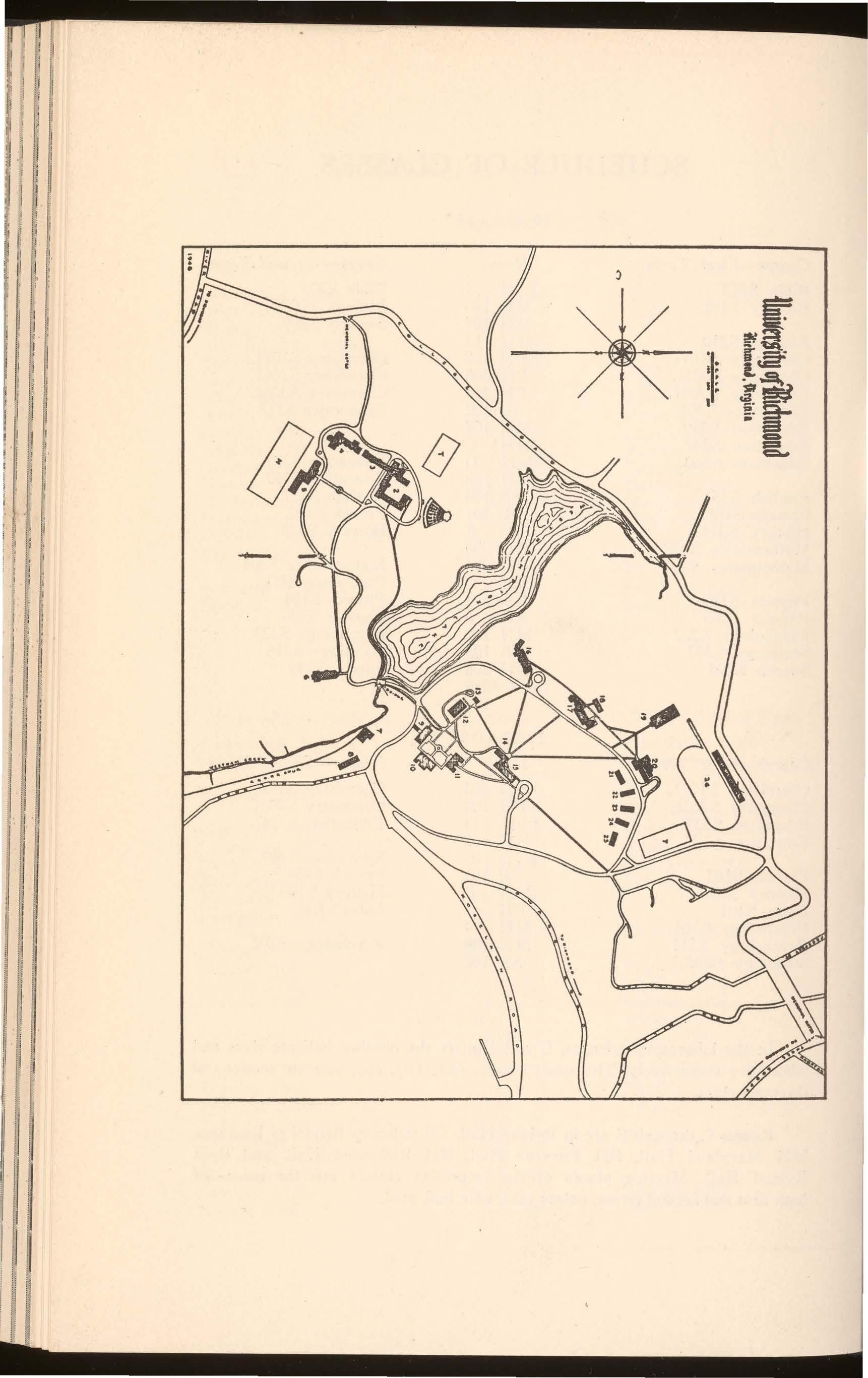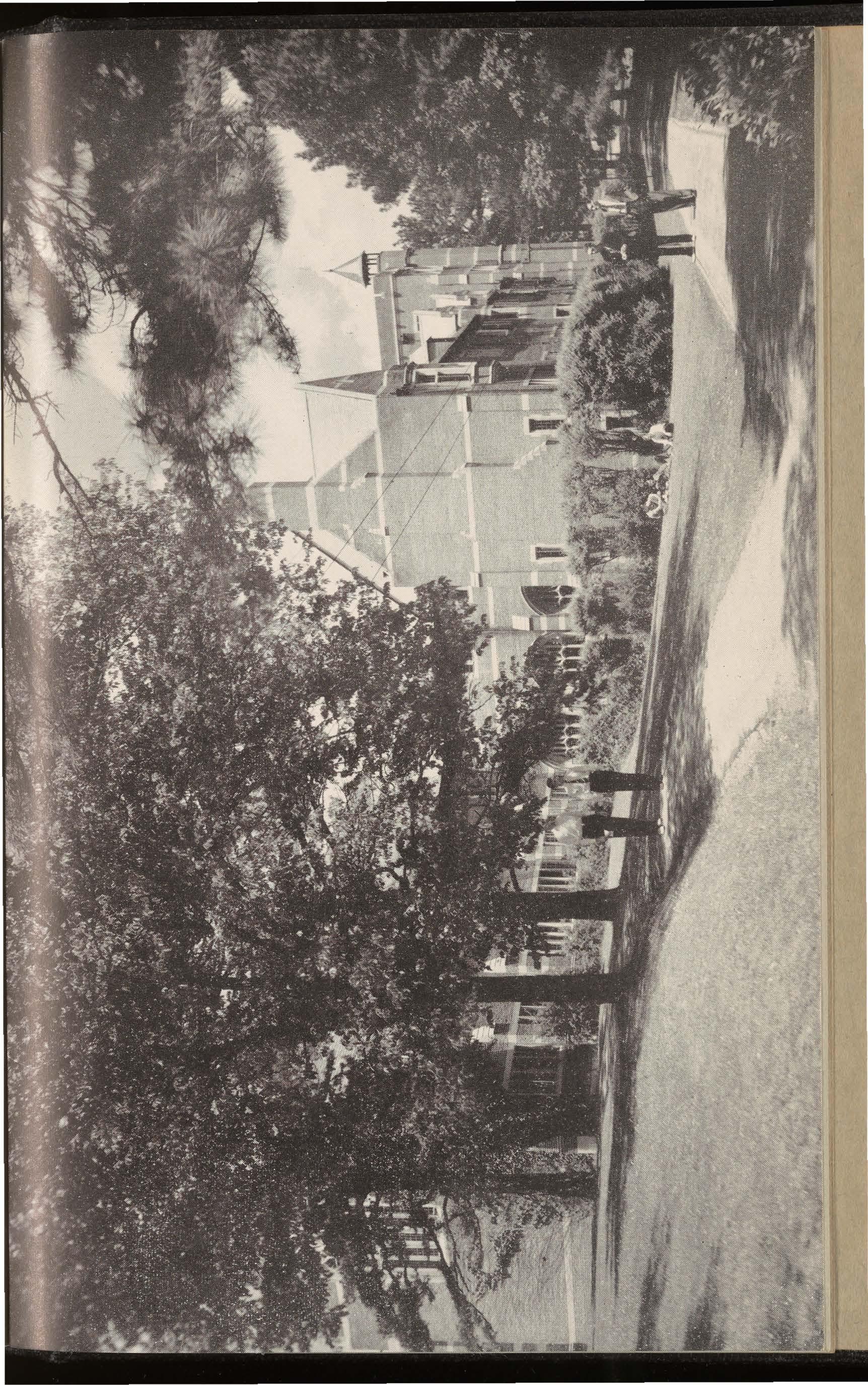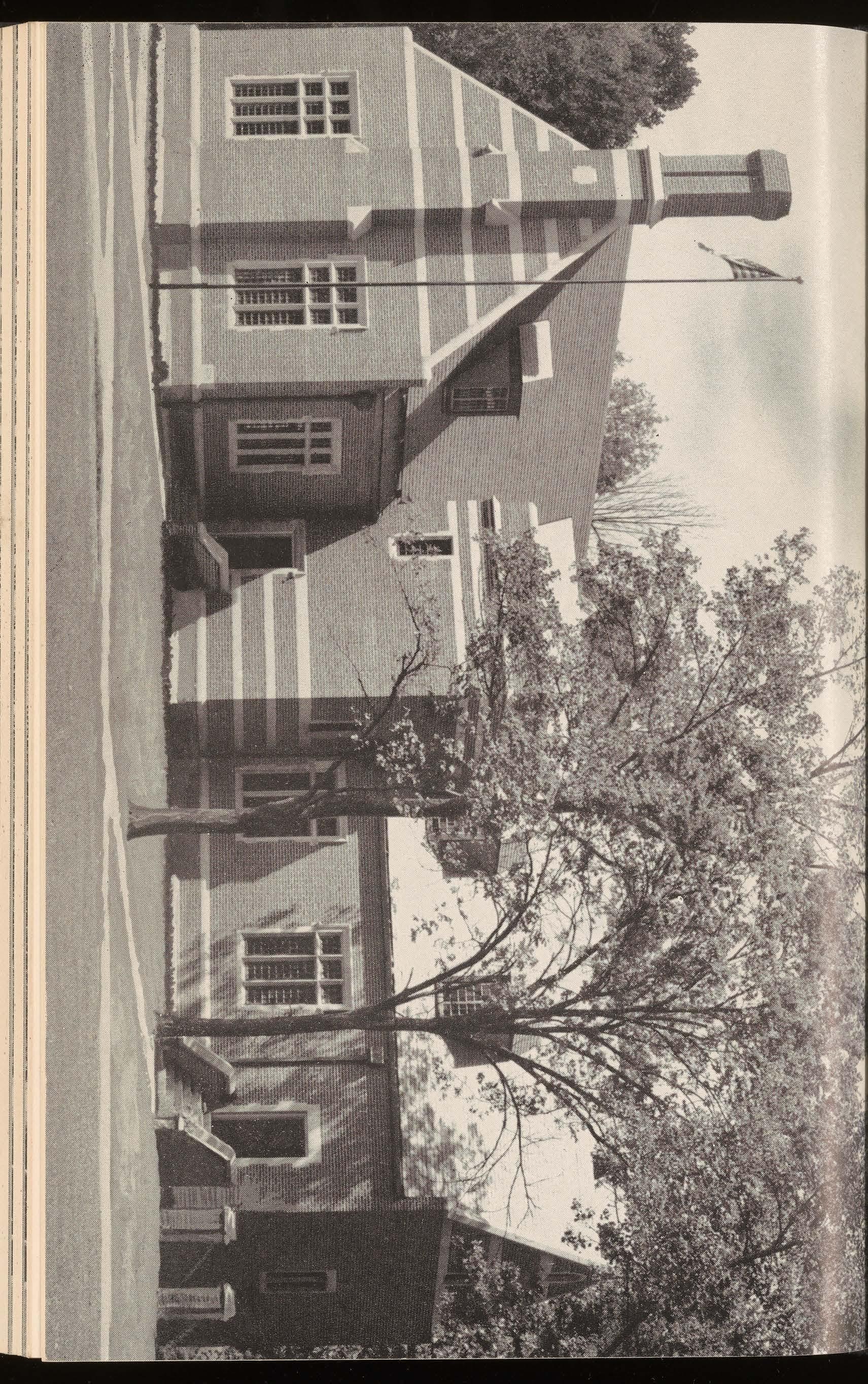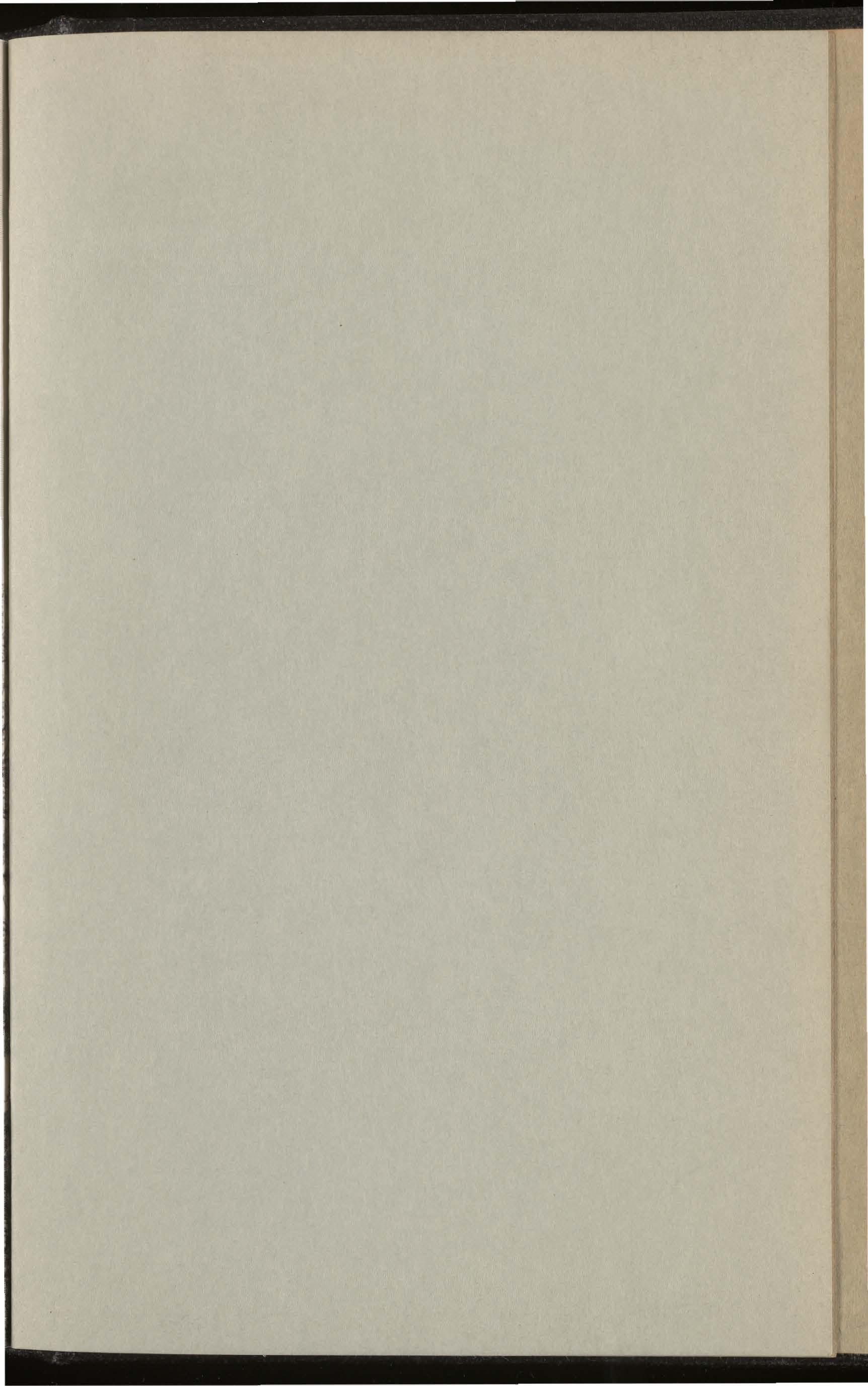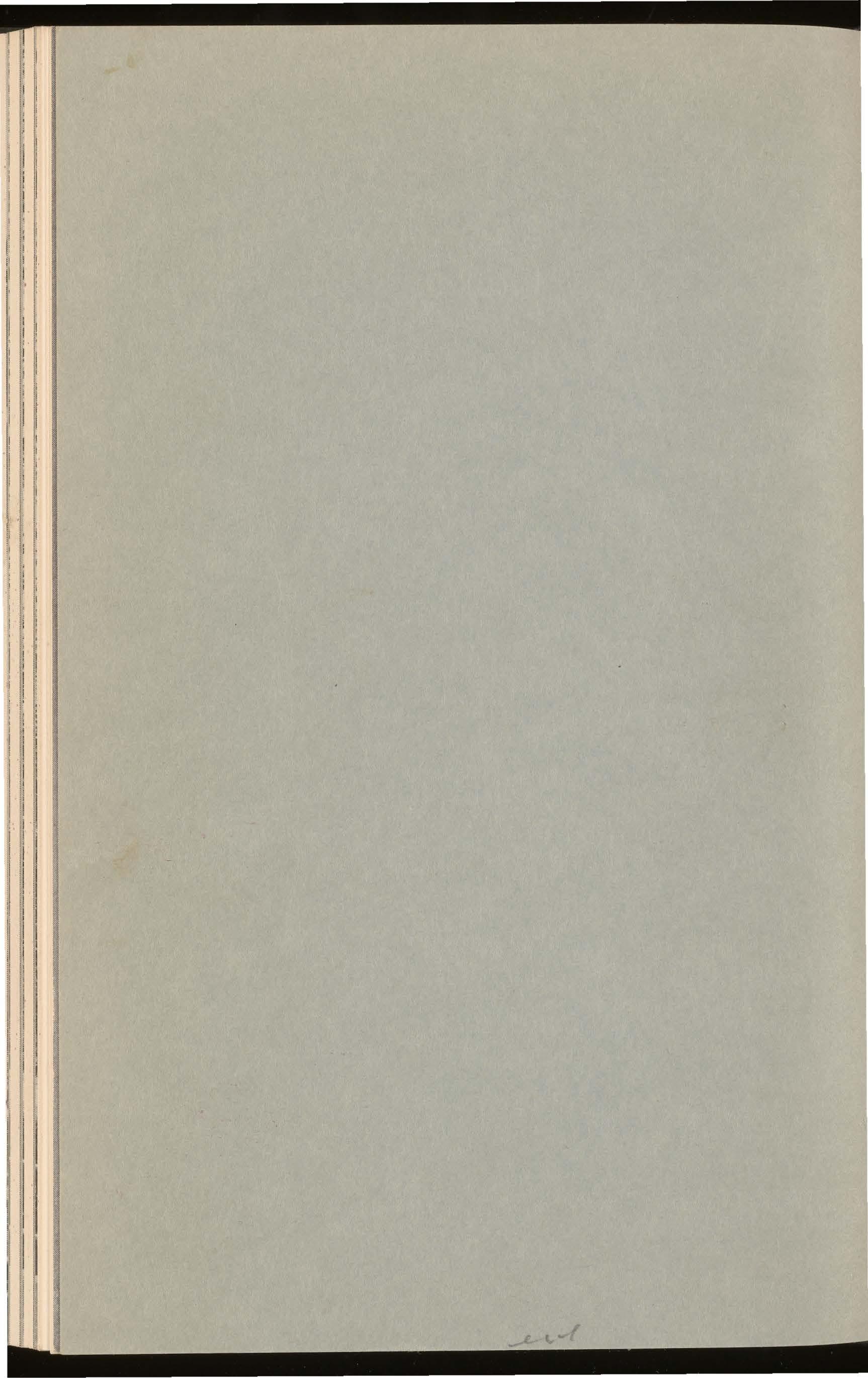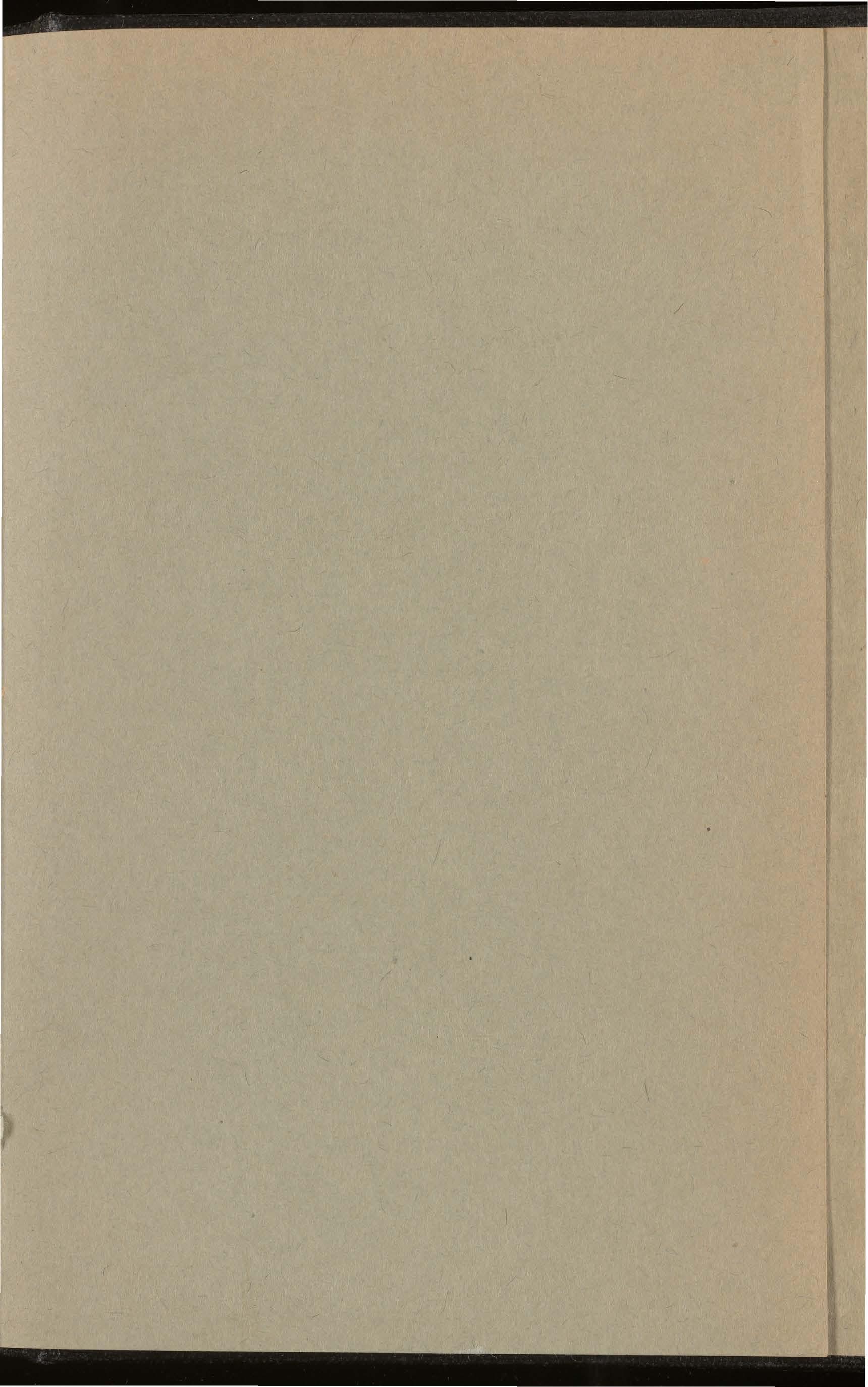UniUtr5itDofiichmond BULLETIN
LIBRARY
UNIVERSITY OF RICHMOND
VI. GINIA
Summer School
C ATALOGUE NUMBER FOR 195 4


LIBRARY
UNIVERSITY OF RICHMOND
VI. GINIA
C ATALOGUE NUMBER FOR 195 4

V OLUME LVI
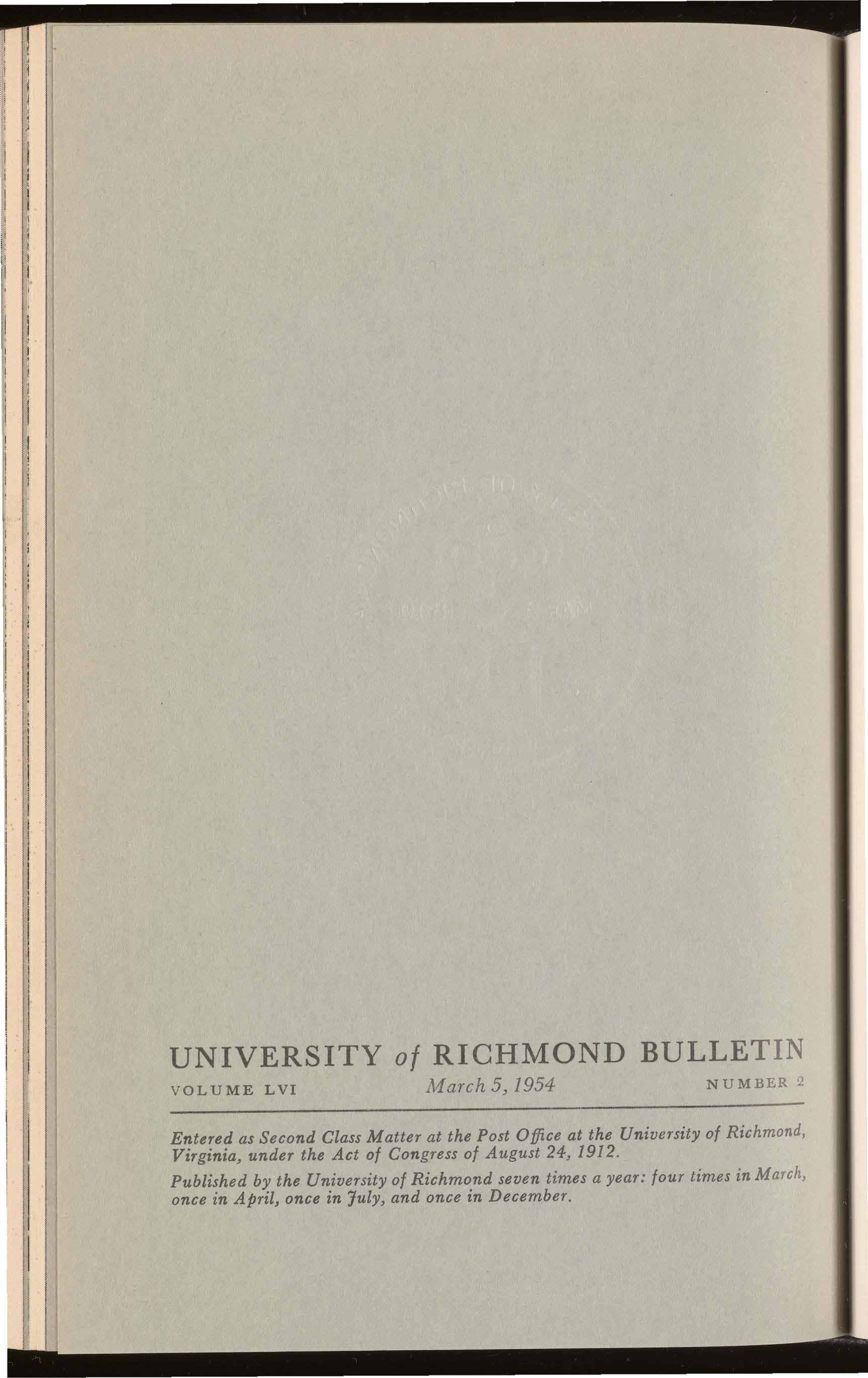
March 5, 1954
N U M BER 2
Entered as Second Class Matter at the Post Office at the University of Rich mond, Virginia, under the Act of Congress of August 24, 1912
Published by the University of Richmond seven times a year: four times in March, once in April, once in July, and once in December.
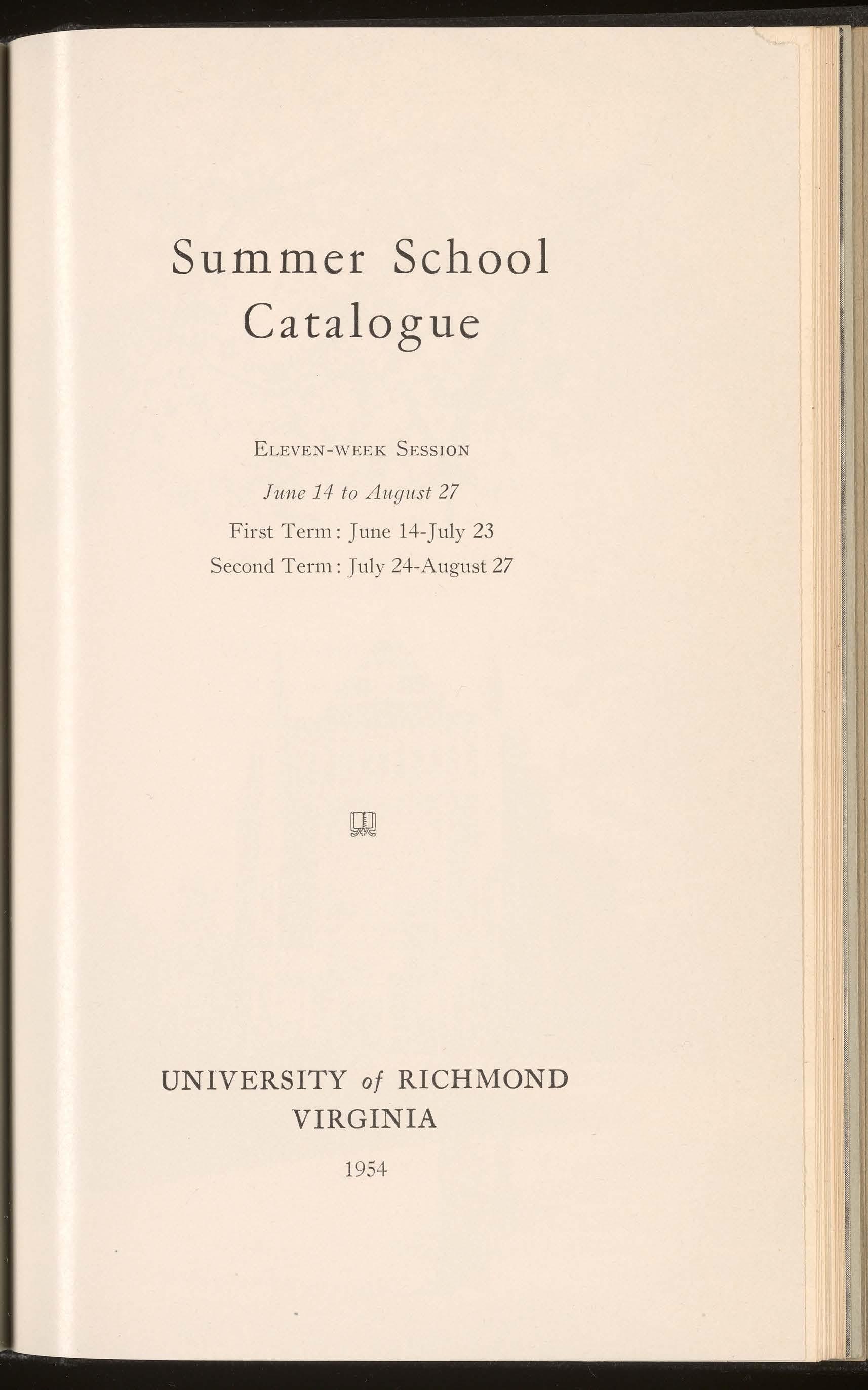
ELEVEN-WEEK SESSION
June 14 to August 27
First Term: June 14-July 23
Second Term: July 2-1--August27
UNIVERSITY of RICHMOND
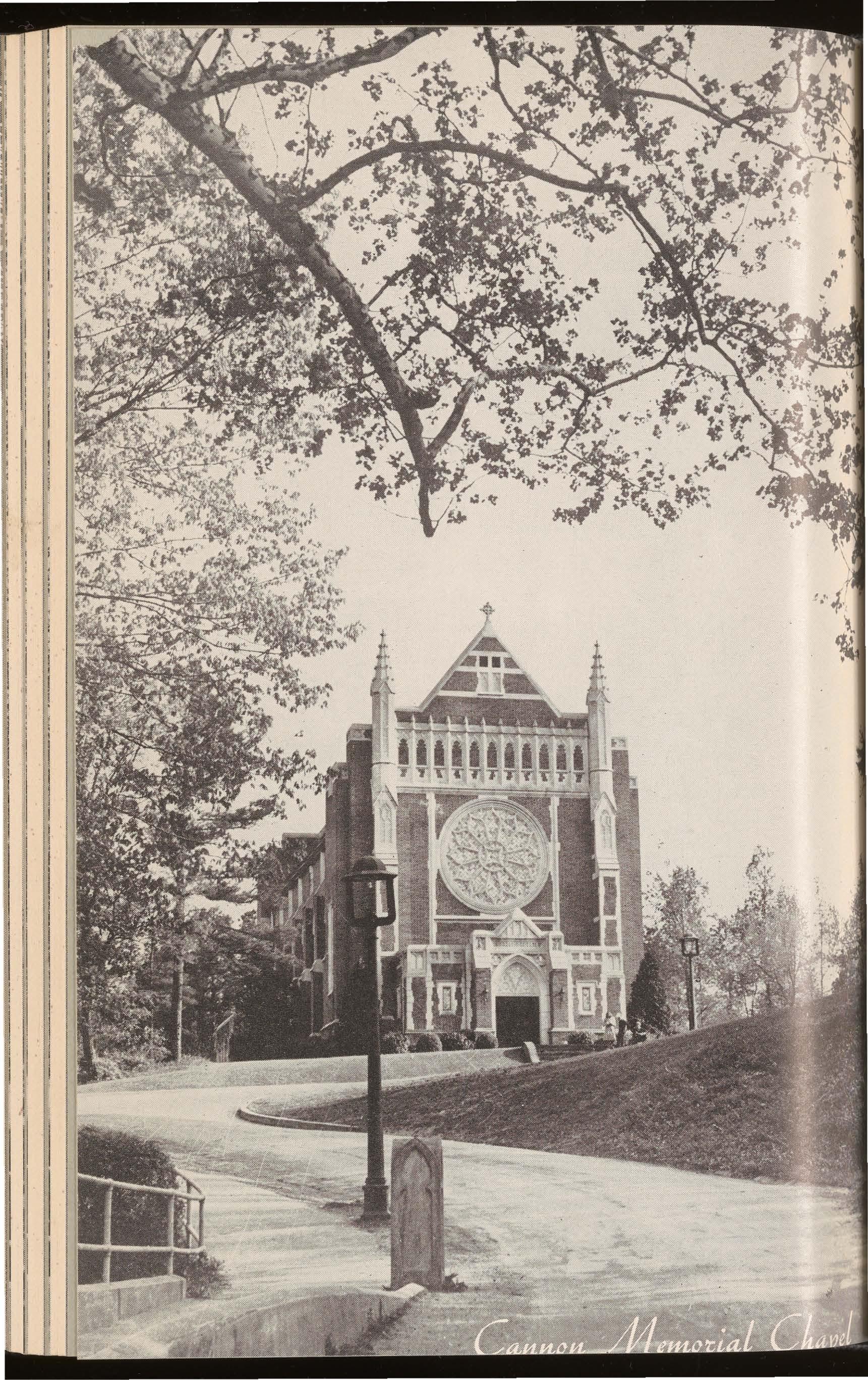
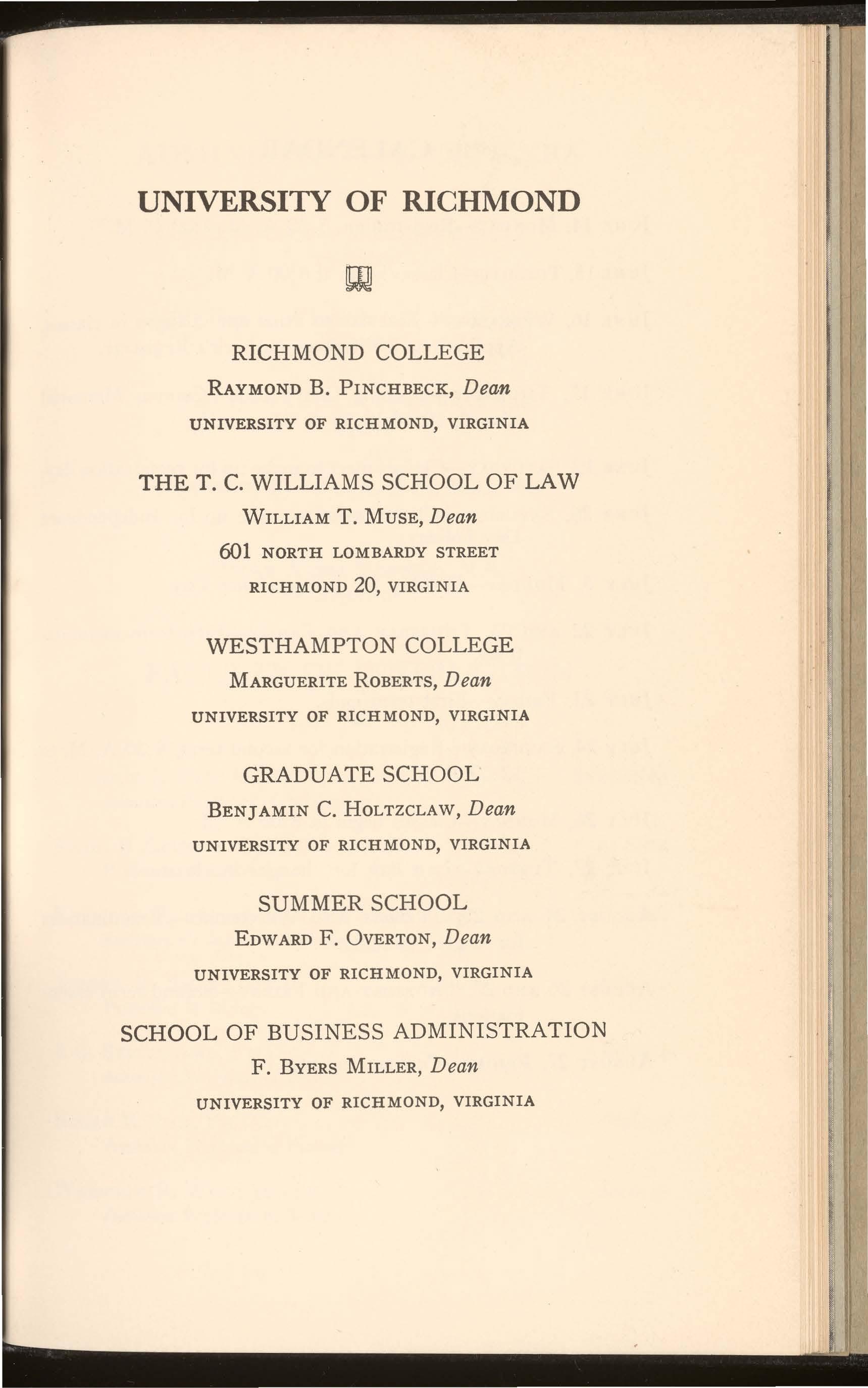
RICHMOND COLLEGE
RAYMOND B. PINCHBECK, Dean
UNIVERSITY OF RICHMOND, VIRGINIA
THE T. C. WILLIAMS SCHOOL OF LAW
WILLIAM T. MusE, Dean
601 NORTH LOMBARDY STREET
RICHMOND 20, VIRGINIA
WESTHAMPTON COLLEGE
MARGUERITE ROBERTS, Dean
UNIVERSITY OF RICHMOND, VIRGINIA
GRADUATE SCHOOL
BENJAMIN C. HOLTZCLAW, Dean
UNIVERSITY OF RICHMOND, VIRGINIA
SUMMER SCHOOL
EDWARD F. OVERTON, Dean
UNIVERSITY OF RICHMOND, VIRGINIA
SCHOOL OF BUSINESS ADMINISTRATION
F. BYERS MILLER, Dean
UNIVERSITY OF RICHMOND, VIRGINIA
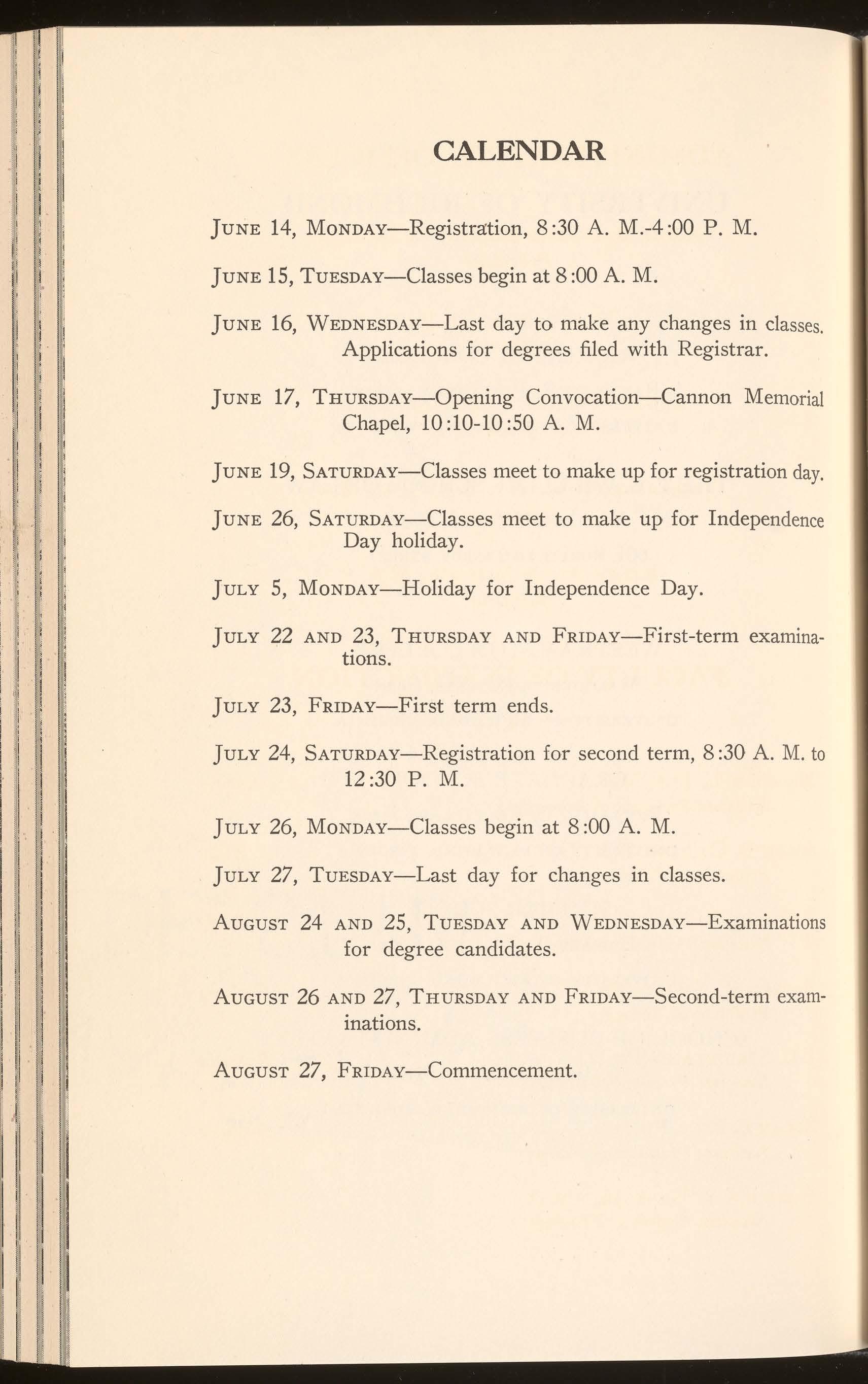
JUNE 14, MoNDAY-Registra:tion, 8:30 A. M.-4:00 P. M.
JuNE 15, TUESDAY-Classes begin at 8:00 A. M.
JUNE 16, WEDNESDAY-Last day to make any changes in classes. Applications for degrees filed with Registrar.
JUNE 17, THURSDAY-Opening Convocation-Cannon Memorial Chapel, 10 :10-10 :SO A. M.
JuNE 19, SATURDAY-Classes meet to make up for registration day.
JUNE 26, SATURDAY-Classes meet to make up for Independence Day holiday.
JULY 5, MONDAY-Holiday for Independence Day.
JULY 22 AND 23, THURSDAYAND FRIDAY-First-term examinations.
JULY 23, FRIDAY-First term ends.
JULY 24, SATURDAY-Registration for second term, 8 :30 A. M. to 12 :30 P. M.
JULY 26, MONDAY-Classes begin at 8 :00 A. M.
JuLY 27, TUESDAY-Last day for changes in classes.
AUGUST 24 AND 25, TUESDAYAND WEDNESDAY-Examinations for degree candidates.
AUGUST26 AND27, THURSDAYANDFRIDAY-Second-term examinations.
AUGUST27, FRIDAY-Commencement.
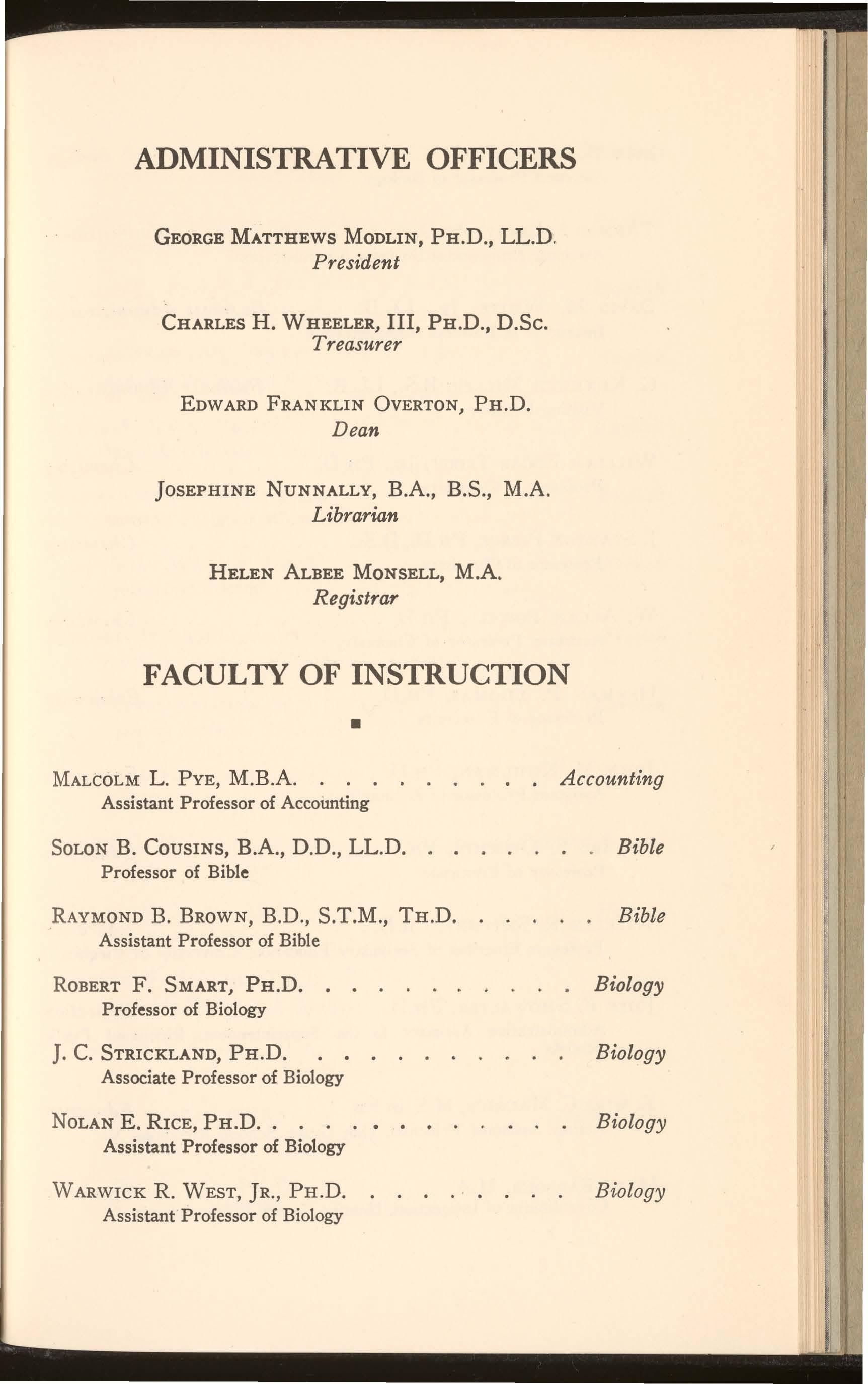
GEORGE MATTHEWS MODLIN, PH.D., LL.D. President
CHARLES H. WHEELER, III, PH.D., D.Sc. Treasurer
EDWARD FRANKLIN OVERTON, PH.D. Dean
JOSEPHINE NUNNALLY, B.A., B.S., M.A. Librarian
HELEN ALBEE MoNSELL, M.A. Registrar
MALCOLM L. PYE, M.B.A .•.
Accounting Assistant Professor of Accounting
SOLON B. COUSINS, B.A., D.D., LL.D. Professor of Bible
RAYMOND B. BROWN, B.D., S.T.M., TH.D. Assistant Professor of Bible
ROBERT F. SMART, PH.D. Professor of Biology
J.C. STRICKLAND, PH.D. Associate Professor of Biology
NOLAN E. RICE, PH.D.
Assistant Professor of Biology
WARWICK R. WEST, JR., PH.D.
Assistant Professor of Biology

]ACK D. BURKE, PH.D Biology Assistant Professor of Biology
THOMAS s. BERRY, PH.D. . Business Administration Associate Professor of Business Administration
DAVID M. WHITE, JR., LL.B. • Business Administration Instructor in Business Administration
G. KENNETH MILLER, B.S., LL.B. Business Administrat ion Visiting Lecturer
WILLIAM EDGAR TROUT, JR. , PH.D. . Chemistry Professor of Chemistry
J . STANTON PIERCE, PH.D., D.Sc. Chemistry Professor of Chemistry
w. ALLAN POWELL, PH.D .. Chemistr y Assistant Professor of Chemistry
HERMAN P. THOMAS, PH.D. Economics Professor of Economics
JOHN M. KUHLMAN, PH.D. Economics Assistant Professor of Economics
EDWARD F. OVERTON, PH.D. Education Professor of Education
WILLIAM R. SMITHEY, PH.D . Educat ion Professor Emeritus of Secondary Education, University of Virginia
JoHN F. SHOWALTER, PH.D. • Education Administrative Assistant to the Superintendent, Richmond Public Schools
ELMIRA C. MAURICE, M.S. in ED. Education Acting Assistant Principal, Oak Grove School, Richmond Va.
MARY BARBOUR, M.A. Education Co-ordinator of Instruction, Henrico County Public Schools
HELEN A. MoNsELL, M.A. • Registrar of Richmond College
SAMtr:EL w. STEVENSON, PH.D. Professor of English
EDWARD C. PEPLE, PH.D. Associate Professor of English
RODNEY M. BAINE, PH.D. Associate Professor of English
LEWIS F. BALL, PH.D. Associate Professor of English
NATHANIEL H. HENRY, PH.D. Assistant Professor of English
JEAN GRAY WRIGHT, PH.D. Professor of French
THOMAS E. LAVENDER, PH.D.
Associate Professor of Romance Languages
N. WILFORD SKINNER, M.A. Assistant Professor of German
ROBERT R. BREWSTER, PH.D. • Assistant Professor of German
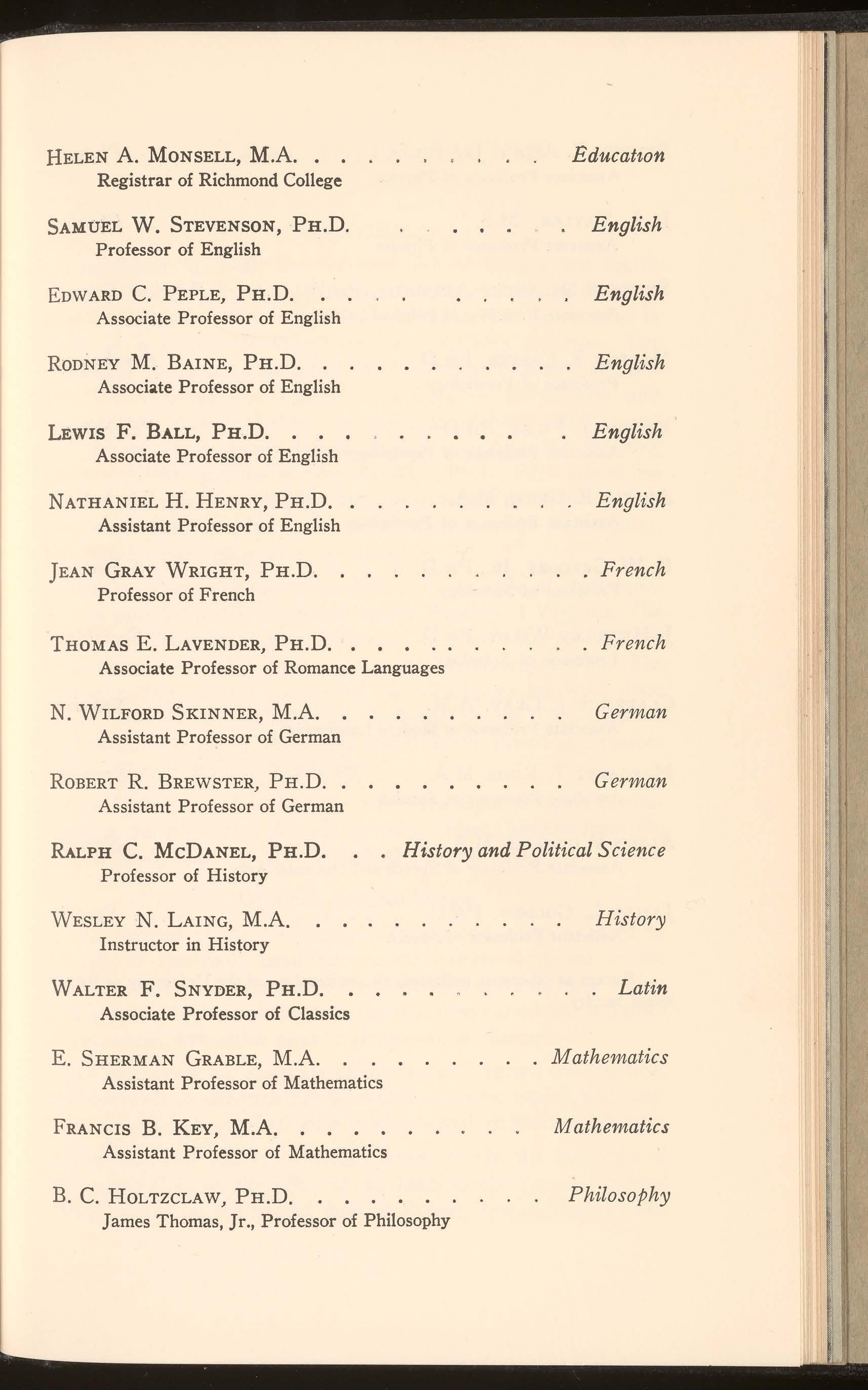
Education
English
English English English English . French . French German German
RALPH C. McDANEL, PH.D. History and Political Science Professor of History
WESLEY N. LAING, M.A. History Instructor in History
wALTER F. SNYDER, PH.D. Latin Associate Professor of Classics
E. SHERMAN GRABLE, M.A. . Mathematics
Assistant Professor of Mathematics
FRANCIS B. KEY, M.A. Mathematics Assistant Professor of Mathematics
B. C. HOLTZCLAW, PH.D. Philosophy James Thomas, Jr., Professor of Philosophy
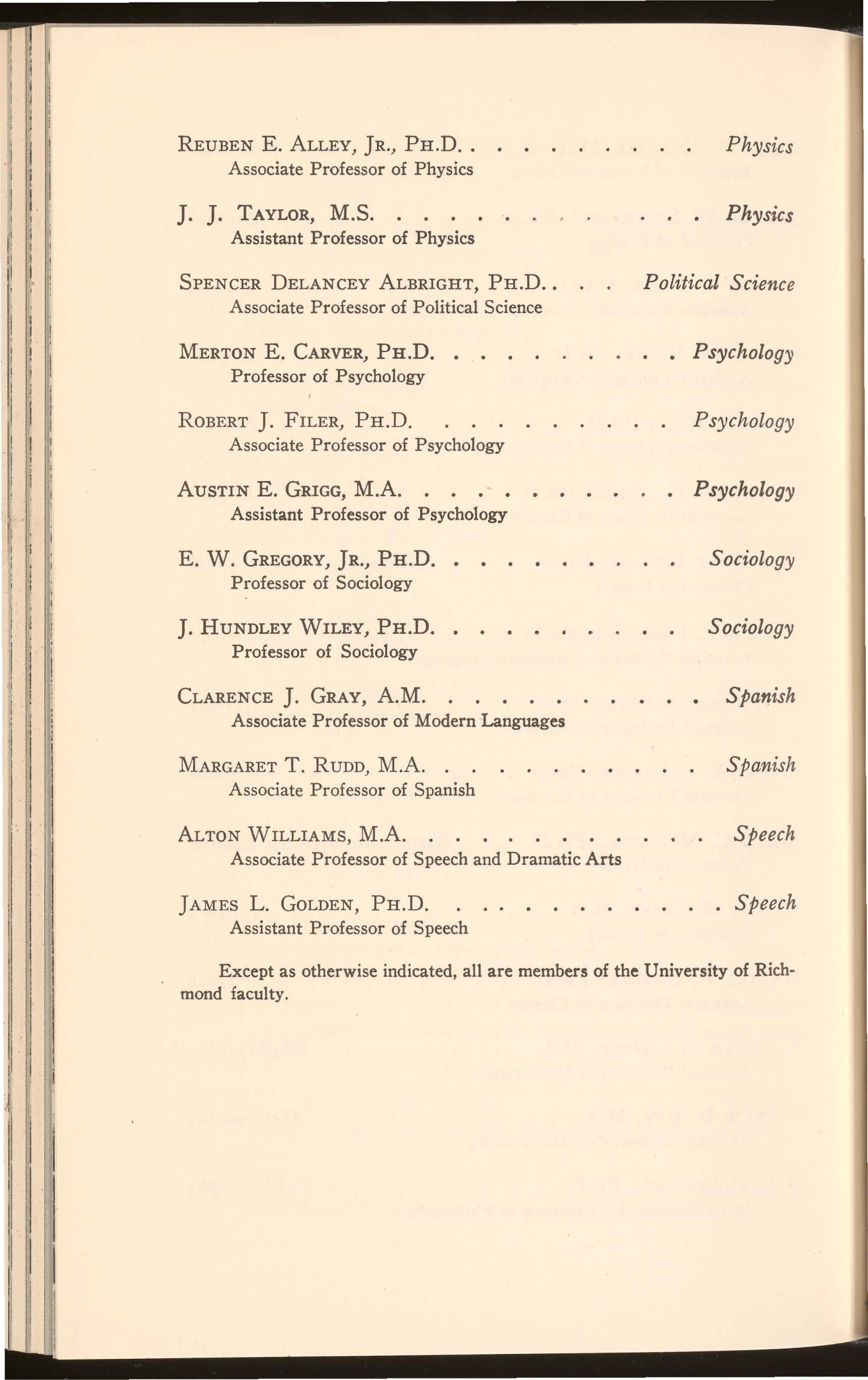
REUBEN E. ALLEY, JR., PH.D .• Associate Professor of Physics
J. J. TAYLOR, M.S.
Assistant Professor of Physics
SPENCER DELANCEY ALBRIGHT, PH.D •• Associate Professor of Political Science
MERTON E. CARVER, PH.D. Professor of Psychology
ROBERT J. FILER, PH.D.
Associate Professor of Psychology
AUSTIN E. GRIGG, M.A.
Assistant Professor of Psychology
E. w. GREGORY, JR., PH.D. Professor of Sociology
J. HUNDLEY WILEY, PH.D. Professor of Sociology
CLARENCE J. GRAY, A.M.
Associate Professor of Modern Languages
MARGARETT. RUDD, M A Associate Professor of Spanish
ALTON WILLIAMS, M.A.
Associate Professor of Speech and Dramatic Arts
JAMES L. GOLDEN, PH.D.
Assistant Professor of Speech
Except as otherwise indicated, all are members of the University of Richmond faculty

Established in 1920, the Summer School became the fourth school in the University of Richmond. The first of the six divisions of the University of Richmond was Richmond College, founded in 1830, as a college of liberal arts and sciences for men. The remaining divisions include the T. C. Williams School of Law ( 1870) ; Westhampton College, a college of liberal arts and sciences for women (1914); the Graduate School (1921); and the School of Business Administration including the morning division ( 1949) and the evening division ( 1924). Each school has its own dean, its own faculty, and its own institutional life. The University Senate, on which sit representatives of all the faculties, provides for intercollegiate cooperation.
The legal name of the corporation is University of Richmond. It was founded and is supported by the Baptists of Virginia. The Board of Trustees of the University of Richmond controls all endowment and other funds and makes all appropriations. The several colleges award no degrees, but all degrees for work done in any one of the colleges are conferred by the University of Richmond. Ultimate authority is vested in the Board of Trustees and the President of the University.
The University of Richmond, one of the eight affiliated institutions of the Richmond Area University Center, benefits from the several co-operative programs operated by the Center.
The campus of the University of Richmond, often referred to as one of the most beautiful natural college campuses in the United States, contains nearly three hundred acres of open spaces and woodlands. It is situated on the hills above the historic James River, about five miles west of downtown Richmond.
All permanent buildings are of substantial fireproof construction, and everywhere attention has been paid to safety, health, and comfort in surroundings of striking landscape and architectural beauty.
The Summer School is usually conducted in the buildings of Richmond College, the office of the Dean of the Summer School being located on the second floor of Robert Ryland Hall. In this

same building are located the other offices of administration and several classrooms. The science departments are in Puryear Hall (chemistry), Richmond Hall (physics), and Maryland Hall (biology). The School of Business Administration is located in its own building on the main campus. The T. C. Williams School of Law expects to move into its new building on the main campus in the summer of 1954 but its summer classes will meet in Columbia Building at Grace and Lombardy Streets.
The libraries of the University contain approximately 120,000 volumes including Government documents. The main collection of the University Library is housed in the Charles Hill Ryland Hall. Collections of technical and professional books are located in the science buildings and The T C. Williams School of Law.
In addition to the University libraries the collections in the Richmond Public Library, Virginia State Library, Medical College of Virginia Library and the Virginia Historical Society Library afford exceptional facilities for research.
Courses are offered to meet the needs of the following :
1. Regular college students, as well as those working on an accelerated program.
2. Pre-professional students desiring to meet entrance requirements of medical, law, and other professional and technical schools.
3. Students in The T. C. Williams School of Law.
4. Students in the School of Business Administration.
5. Teachers wishing to obtain credit toward degrees or certificates, or to renew certificates.
6. Graduate students desiring work leading to the degrees of Master of Arts, Master of Science, Master of Science in Education, and Master of Science in Business Administration.
Law classes will meet in the Columbia Building, Grace Street at Lombardy. All other classes will meet on the main University campus.
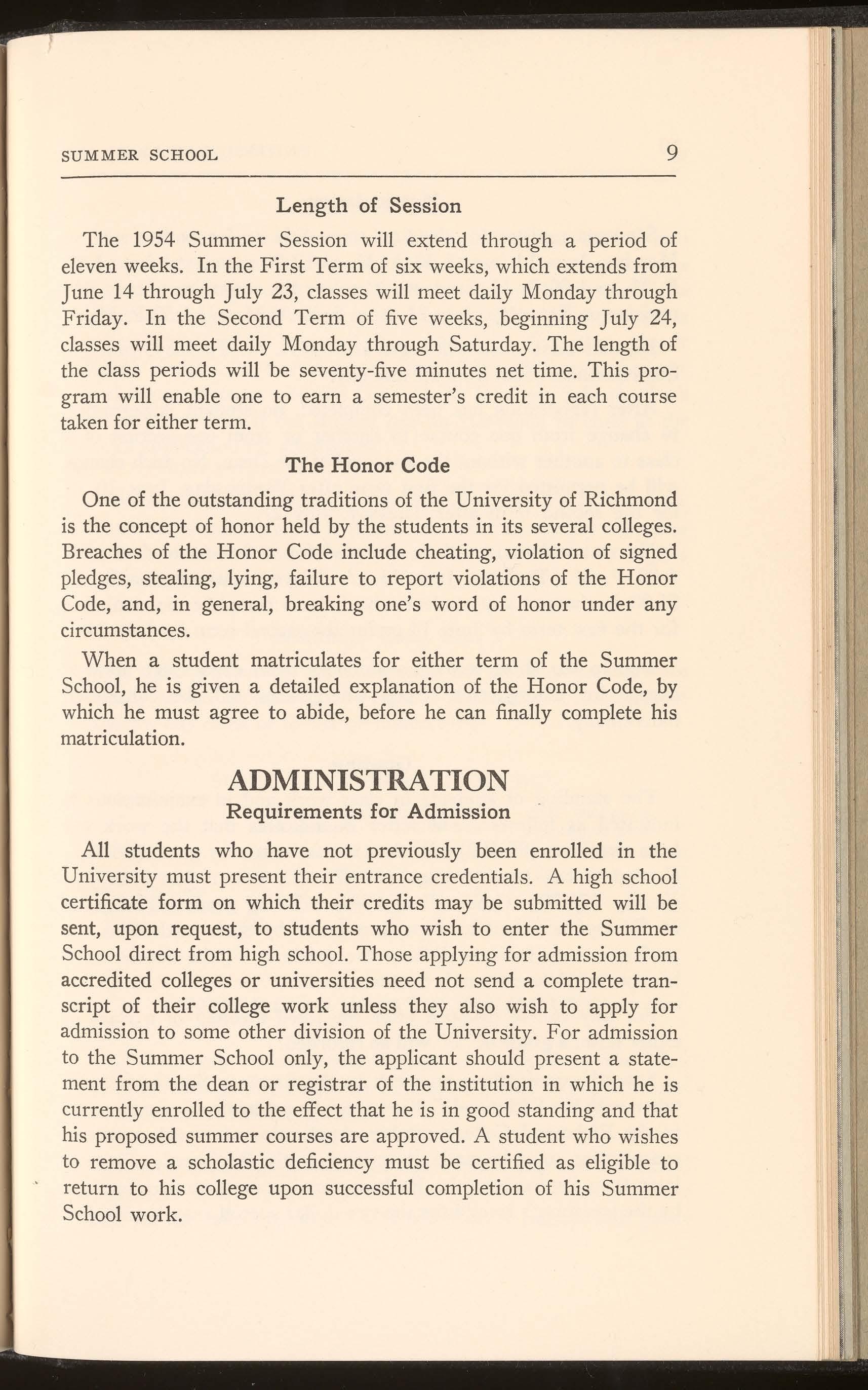
The 1954 Summer Session will extend through a period of eleven weeks. In the First Term of six weeks, which extends from June 14 through July 23, classes will meet daily Monday through Friday. In the Second Term of five weeks, beginning July 24, classes will meet daily Monday through Saturday. The length of the class periods will be seventy-five minutes net time. This program will enable one to earn a semester's credit in each course taken for either term.
One of the outstanding traditions of the University of Richmond is the concept of honor held by the students in its several colleges. Breaches of the Honor Code include cheating, violation of signed pledges, stealing, lying, failure to report violations of the Honor Code, and, in general, breaking one's word of honor under any circumstances.
When a student matriculates for either term of the Summer School, he is given a detailed explanation of the Honor Code, by which he must agree to abide, before he can finally complete his matriculation.
All students who have not previously been enrolled in the University must present their entrance credentials. A high school certificate form on which their credits may be submitted will be sent, upon request, to students who wish to enter the Summer School direct from high school. Those applying for admission from accredited colleges or universities need not send a complete transcript of their college work unless they also wish to apply for admission to some other division of the University. For admission to the Summer School only, the applicant should present a statement from the dean or registrar of the institution in which he is currently enrolled to the effect that he is in good standing and that his proposed summer courses are approved. A student who wishes to remove a scholastic deficiency must be certified as eligible to return to his college upon successful completion of his Summer School work.
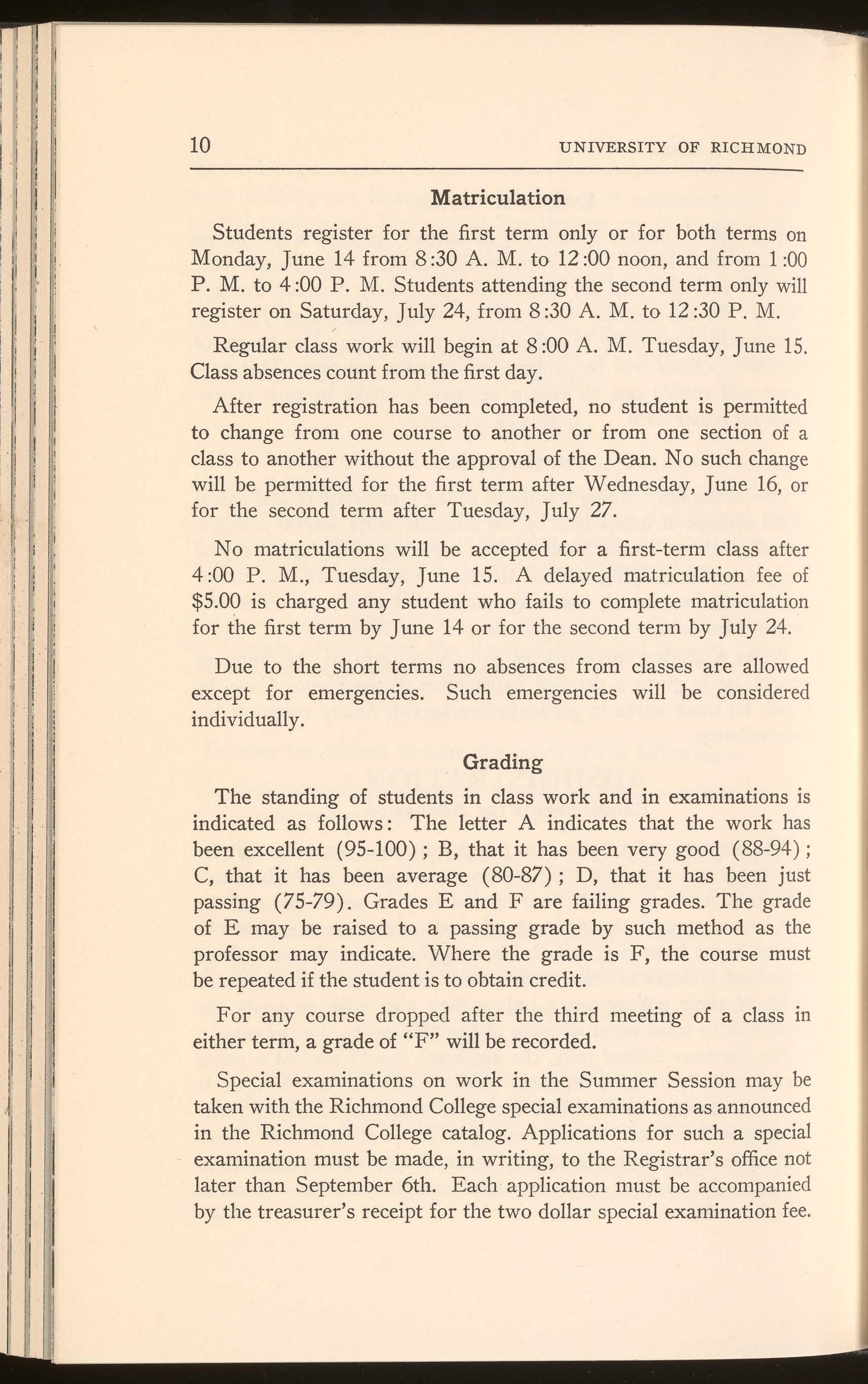
Students register for the first term only or for both terms on Monday, June 14 from 8 :30 A. M. to 12 :00 noon, and from 1 :00 P. M. to 4 :00 P. M. Students attending the second term only will register on Saturday, July 24, from 8 :30 A. M. to 12 :30 P. M. , Regular class work will begin at 8 :00 A. M. Tuesday, June 15 Class absences count from the first day.
After registration has been completed, no student is permitted to change from one course to another or from one section of a class to another without the approval of the Dean. No such change will be permitted for the first term after Wednesday, June 16, or for the second term after Tuesday, July 27.
No matriculations will be accepted for a first-term class after 4 :00 P. M., Tuesday, June 15. A delayed matriculation fee of $5.00 is charged any student who fails to complete matriculation for the first term by June 14 or for the second term by July 24.
Due to the short terms no absences from classes are allowed except for emergencies. Such emergencies will be considered individually.
The standing of students in class work and in examinations is indicated as follows : The letter A indicates that the work has been excellent (95-100); B, that it has been very good (88-94); C, that it has been average (80-87) ; D, that it has been just passing (75-79). Grades E and F are failing grades. The grade of E may be raised to a passing grade by such method as the professor may indicate. Where the grade is F, the course must be repeated if the student is to obtain credit.
For any course dropped after the third meeting of a class in either term, a grade of "F" will be recorded.
Special examinations on work in the Summer Session may be taken with the Richmond College special examinations as announced in the Richmond College catalog. Applications for such a special examination must be made, in writing, to the Registrar's office not later than September 6th. Each application must be accompanied by the treasurer's receipt for the two dollar special examination fee.
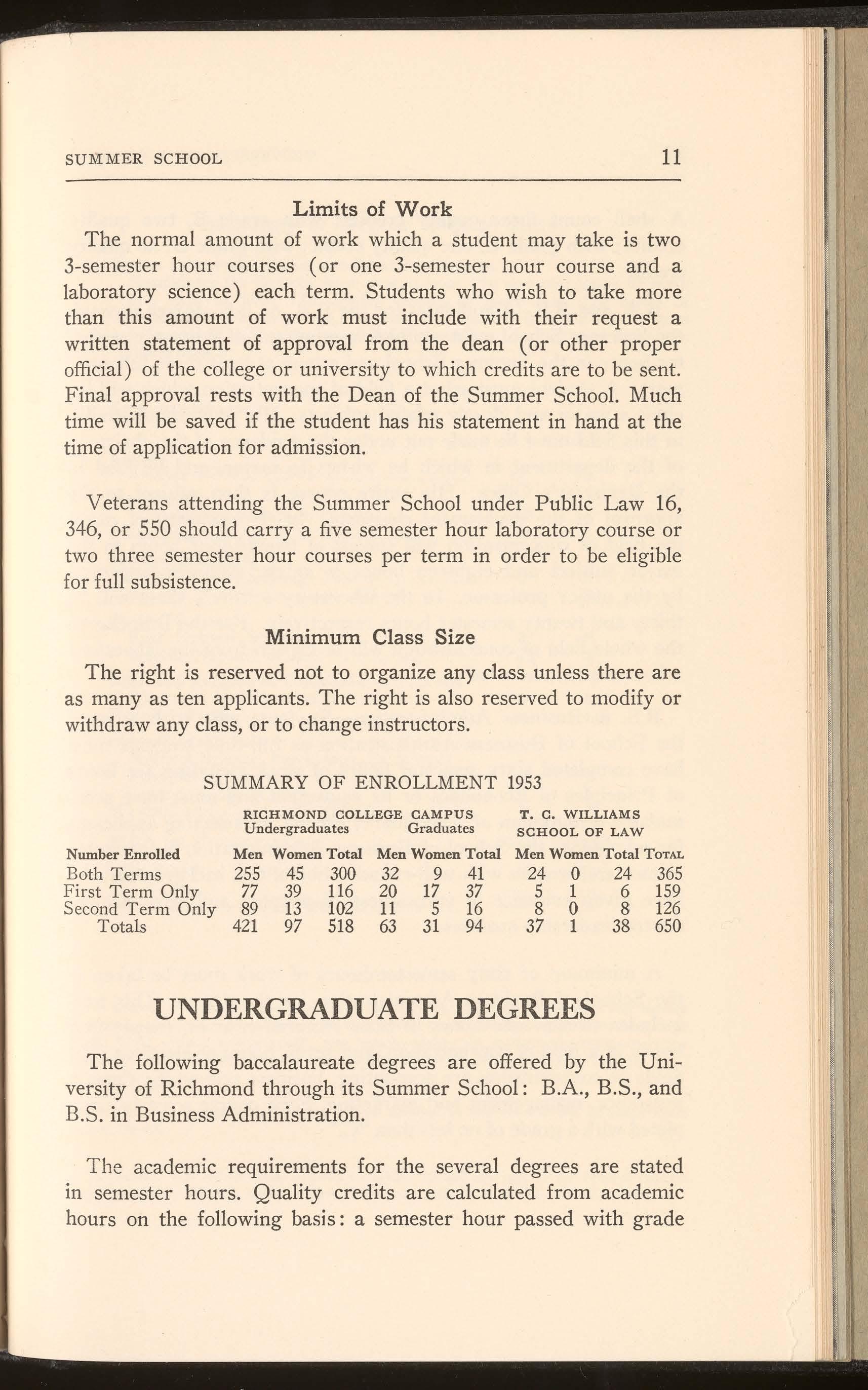
The normal amount of work which a student may take is two 3-semester hour courses ( or one 3-semester hour course and a la boratory science) each term. Students who wish to take more than this amount of work must include with their request a written statement of approval from the dean ( or other proper official) of the college or university to which credits are to be sent Final approval rests with the Dean of the Summer School. Much time will be saved if the student has his statement in hand at the time of application for admission.
Veterans attending the Summer School under Public Law 16, 346, or 550 should carry a five semester hour laboratory course or two three semester hour courses per term in order to be eligible for full subsistence.
The right is reserved not to organize any class unless there are as many as ten applicants. The right is also reserved to modify or withdraw any class, or to change instructors.
RICHMOND COLLEGE CAMPUS T. C, WILLIAMS Undergraduates Graduates SCHOOL OF LAW
The following baccalaureate degrees are offered by the University of Richmond through its Summer School : B.A ., B.S., and B .S. in Business Administration.
T he a cademic requirements for the several degrees are stated in semester hours. Quality credits are calculated from academic hours on the following basis: a semester hour passed with grade
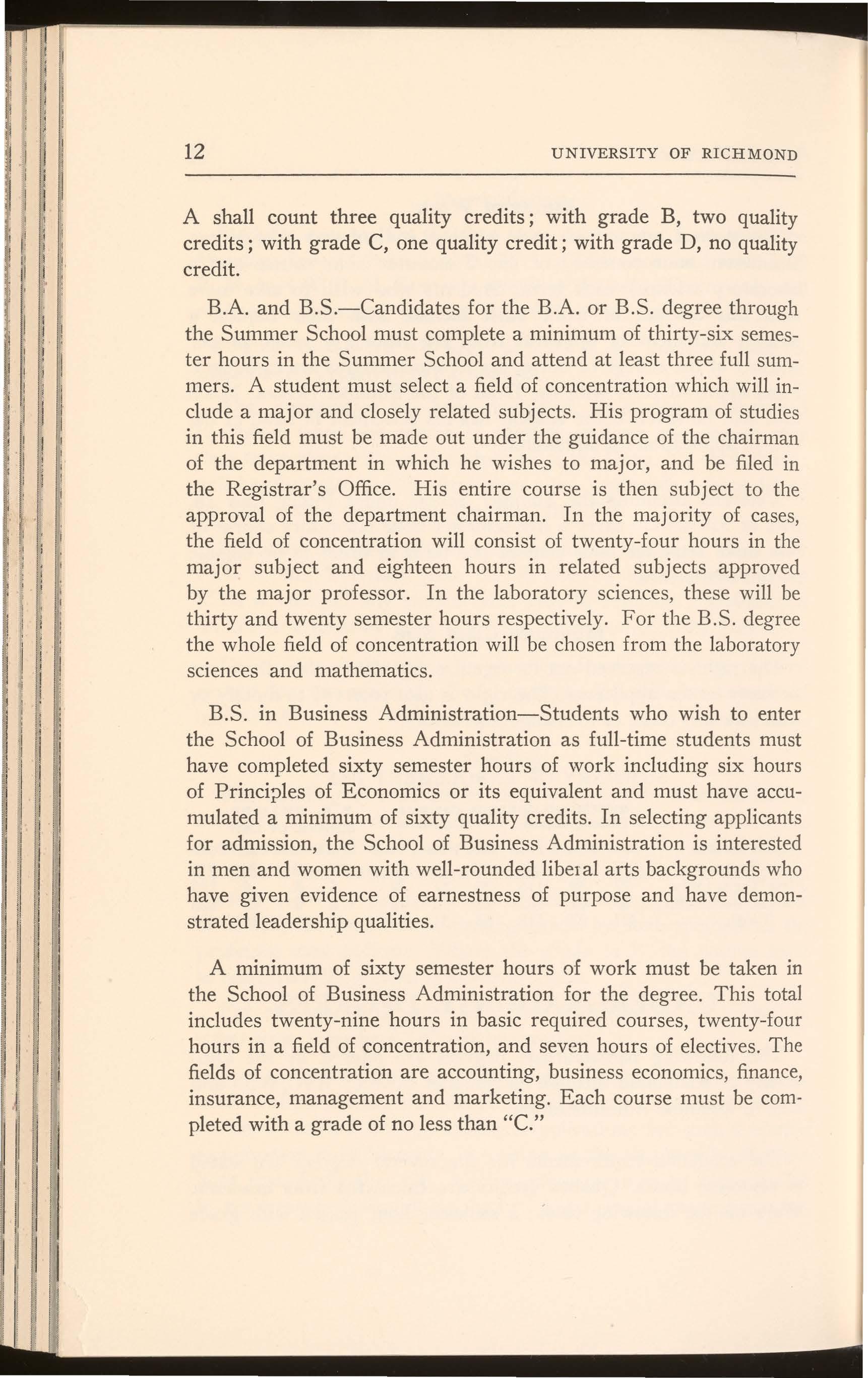
A shall count three quality credits; with grade B, two quality credits; with grade C, one quality credit; with grade D, no quality credit.
B.A. and B.S.-Candidates for the B.A. or B.S. degree through the Summer School must complete a minimum of thirty-six semester hours in the Summer School and attend at least three full summers. A student must select a field of concentration which will include a major and closely related subjects. His program of studies in this field must be made out under the guidance of the chairman of the department in which he wishes to major, and be filed in the Registrar's Office. His entire course is then subject to the approval of the department chairman. In the majority of cases, the field of concentration will consist of twenty-four hours in the major subject and eighteen hours in related subjects approved by the major professor. In the laboratory sciences, these will be thirty and twenty semester hours respectively. For the B.S. degree the whole field of concentration will be chosen from the laboratory sciences and mathematics.
B.S in Business Administration-Students who wish to enter the School of Business Administration as full-time students must have completed sixty semester hours of work including six hours of Princi;:iles of Economics or its equivalent and must have accumulated a minimum of sixty quality credits. In selecting applicants for admission, the School of Business Administration is interested in men and women with well-rounded liberal arts backgrounds who have given evidence of earnestness of purpose and have demonstrated leadership qualities.
A minimum of sixty semester hours of work must be taken in the School of Business Administration for the degree. This total includes twenty-nine hours in basic required courses, twenty-four hours in a field of concentration, and seven hours of electives . The fields of concentration are accounting, business economics, finance, insurance, management and marketing. Each course must be completed with a grade of no less than "C."
I. TOTAL SEMESTER HOURS AND QUALITY CREDITS
Candidates for degrees must pass at least 124 semester hours of work and earn at least 120 quality credits. If more than 120 hours of academic work are passed, the number of quality credits for the degree in excess of 120 is increased by the number of additional academic hours passed.
English
English 101-02, 203-04 .............................
Mathematics
Mathematics 101-02 or 201-02 ...................
Mathematics 201-02 or 301-04
Foreign Languages
First Foreign Language 103-04
Second Foreign Language 103-04
Natural Sciences
First Natural Science
Second Natural Science ............................. .
Bible and Religion or Philosophy or Fine Arts
Historical and Appreciation Courses
History 107-08
Other Social Sciences: ( Economics, Education, Political Science, Psychology, Sociology)
First Social Science Second Social Science ................................. .
Personal and Community Health
III. FIELD OF CONCENTRATION
IV. FREE ELECTIVE s OBJECTS

* A student by passing a special examination on high school plane geometry and algebra through quadratics, or by validating his high school courses in these subjects by completing Math. 51-52 without college credit, may thereby satisfy the mathematics requirement for the B A. Math 101-02, however, is a prerequisite for all advanced science counes.
t The foreign language requirement may be satisfied by two years in one language above course 101-102.
t A student who offers Math. 101-102 or Math. 201-202 may satisfy the natural sciences requirements by offering eight semester hours of credit in only one natural science.
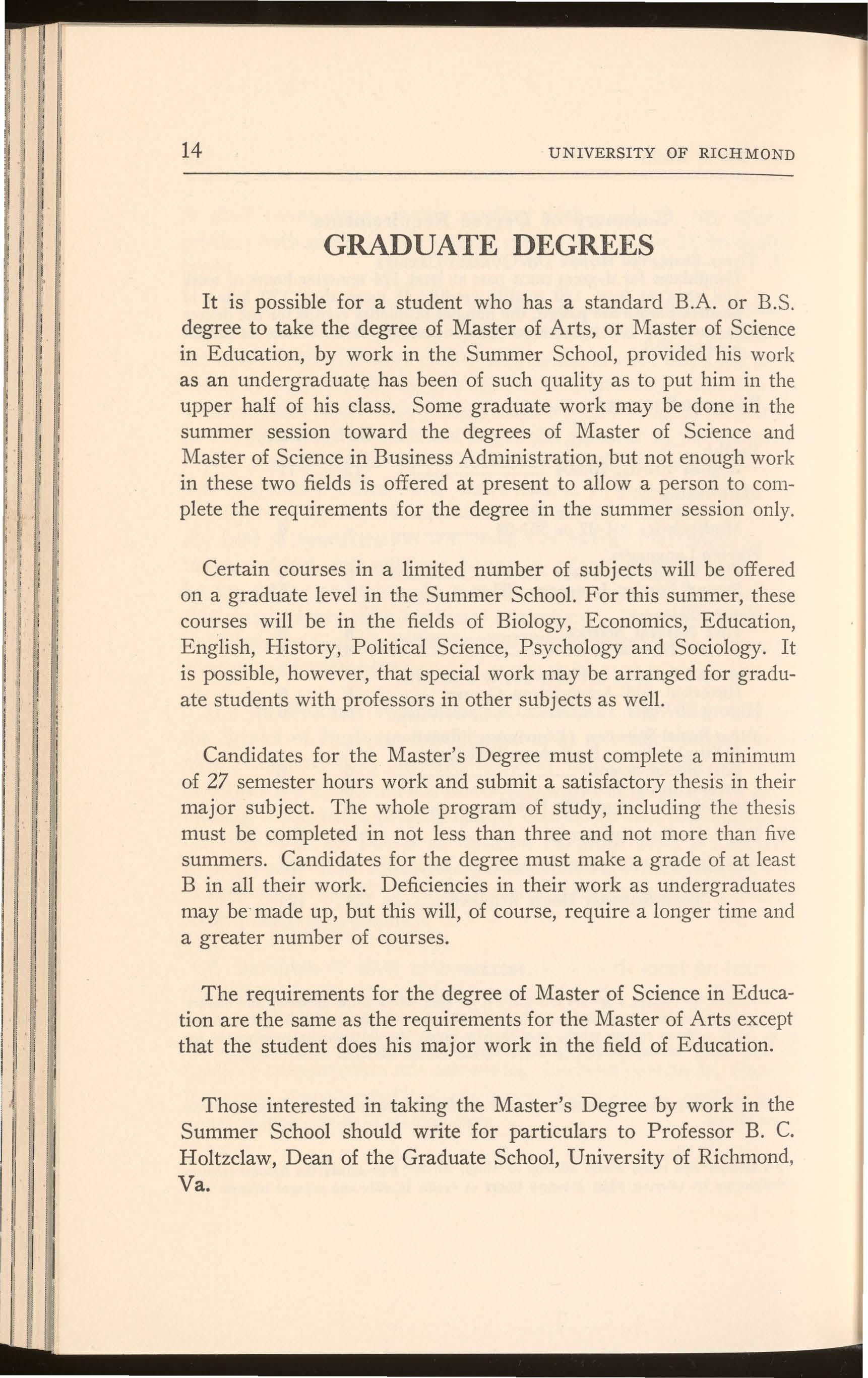
It is possible for a student who has a standard B.A. or B.S. degree to take the degree of Master of Arts, or Master of Science in Education, by work in the Summer School, provided his work as an undergraduate has been of such quality as to put him in the upper half of his class. Some graduate work may be done in the summer session toward the degrees of Master of Science and Master of Science in Business Administration, but not enough work in these two fields is offered at present to allow a person to complete the requirements for the degree in the summer session only.
Certain courses in a limited number of subjects will be offered on a graduate level in the Summer School. For this summer, these courses will be in the fields of Biology, Economics, Education, English, History, Political Science, Psychology and Sociology. It is possible, however, that special work may be arranged for graduate students with professors in other subjects as well.
Candidates for the Master's Degree must complete a minimum of 27 semester hours work and submit a satisfactory thesis in their major subject. The whole program of study, including the the sis must be completed in not less than three and not more than five summers. Candidates for the degree must make a grade of at least B in all their work. Deficiencies in their work as undergraduates may be made up, but this will, of course, require a longer time and a greater number of courses.
The requirements for the degree of Master of Science in Education are the same as the requirements for the Master of Arts except that the student does his major work in the field of Education.
Those interested in taking the Master's Degree by work in the Summer School should write for particulars to Professor B. C. Holtzclaw, Dean of the Graduate School, University of Richmond, Va.

Matriculation fee ( for one or both terms) ............$
Tuition ( each semester hour)
Science Laboratory fee ( for each term) ............... .
Room and Board, first term, six weeks ................. .
Room and Board, second term, five weeks
Board first term for non-resident students ............
Board second term for non-resident students
Bachelor's diploma fee ............................................. .
Master's diploma and hood fee ............................... .
..................................................... .
For auditing a course (i. e., attending without credit) a tuition fee of $20.00 will be charged for each term.
All charges are due at the time of registration. Checks should be made payable to University of Richmond. Deferred payments must be arranged with the Treasurer.
Students are matriculated for a full term. In case of withdrawal for whatever cause, no refund of fees or any part of fees is made. In the event of withdrawal on account of student's sickness, proportionate deductions will be made in the charge for board.
A veteran attending under Public Law 16 or Public Law 346 should have his Certificate of Eligibility and Entitlement when he registers. If he does not have a valid certificate, he will be required to make a deposit which will be equivalent to his fees and the cost of books and supplies.
A veteran attending under Public Law 550 (Korean) must present a Certificate of Education and Training. These veterans will be required to pay their fees in the same manner as non-veteran students.
Dormitory facilities will be provided for both men and women. Rooms will be furnished, but bed linen, pillow cases, towels, etc., must be supplied by the students.
The dormitories and dining halls are operated as a unit and assignments are made by the term. Ordinarily no adjustment is made on account of withdrawal.
No student is allowed to sublet his room, take another student in with him or move from one room to another without permission from the Dean.
The cost of room and board will be $114 .00 for the first term of six weeks and $95.00 for the second term of five weeks. Application for a room in the dormitory should be addressed to the Dean of the Summer School. A deposit of $10.00 must be made by each applicant in order to hold a room . This fee will be refunded only if written notice releasing the room is received by the Dean before May 10, 1954. If the student occupies the room the fee is refundable after the close of the session, less any charges for damage to the University property.
The Virginia General Assembly usually provides a limited number of summer school scholarships for college graduates who wish to qualify for the Collegiate Professional Certificate and for tho se teachers who wish to secure added endorsements for teaching in the elementary grades.
Virginia teachers who are interested in applying for these scholarships should see their division superintendent or write directly to the Dean of the Summer School for detailed information. May 1st is the deadline for filing applications with the State Department of Education.
The post office address is University of Richmond, The telegraph address is Richmond, Virginia.
Degree

DEGREES CONFERRED AUGUST 28, 1953
Bachelor of Arts
Bachelor of Science
Bachelor of Science in Business Administration
Bachelor of Laws
Master of Arts

Courses numbered 100-199, inclusive, are intended primarily for freshmen; those numbered 200-299, inclusive, for sophomores; those numbered 300-399, inclusive, for juniors and seniors and, in some cases, for graduate students; those numbered 400-499 require work of a research nature for graduate credit; those numbered 500-599 are for graduate students only. Courses numbered 300-399 whose number is followed by an asterisk ( *) may be taken by graduate students for graduate credit as one of the "400" courses mentioned above.
The figure in parentheses following the title of a course indicates the number of semester hours credit allowed for that course. Where two numbers, separated by a hyphen, follow the title of a full year course, either half of the course may be taken without the other half.
AccouNTING S203-204 - Fundamentals of Accouuting. (6)
A course designed for those who wish to prepare themselves for accounting, or who seek an understanding of accounting as an aid in a business or profession. It covers the basic accounting principles and records of corporations, partnerships, and sole proprietorships. First and Second Terms, respectively. Puryear Hall, Room 16, 8 :00 A. M. Mr. Pye.
AccouNTING S303-304 - Intermediate Accounting. (6)
Expansion and illustration of the various principles covered in first year accounting. Detailed discussion of the nature of the more important items appearing in financial statements. Prerequisite : Accounting 203-204. First and Second Terms, respectively. Puryear Hall, Room 16, 9 :20 A. M. Mr. Pye.
B.A. S301-S302- Business Law. (6)
Introduction to nature and source of law; fundamentals of the law of contracts, property, sales, negotiable instruments, agency partnerships, corporations; application of law fundamentals to business practice. Required of all degree candidates. First and Second Terms. School of Business, Room 101. 8 :00 A. M. First Term, Mr. White; Second Term, Mr. Miller.
B.A. S341-Industrial Management. (3)
The course covers the field of management and provides a foundation for advanced management training. It deals with the problems of budgets, planning, policies and procedures, and industrial relations. Required of all degree candidates. Second term. School of Business, Room 101. 9 :20 A. M. Mr. Berry.

BIBLE S 103 - The New Testament. ( 3)
The life, teaching, and meaning of Christ as revealed in the four Gospels. First Term. Ryland Hall, Room I. 8 :00 A M. Mr. Brown
BIBLE S 104 - The New Testament (continued). ( 3)
The life and thought of the early church as revealed in the New Testament writings. Second Term. Ryland Hall, Room I. 8 :00 A . M. Mr. Cousins
BIBLE S309- The Poetical and Wisdom Books of the Old Testament. ( 3)
Second Term. Ryland Hall, Room I. 10 :40 A. M. Mr. Cousins.
BIBLE S312 - Biblical Background. (3)
An approach to the study of the Bible. How to know the Bible. (3) First Term. Ryland Hall, Room I. 10 :40 A. M. Mr. Brown.
BIOLOGY S101-S102 -Principles of Biology. (8)
The fundamental principles of Biology and their application to man. First and Second Terms, respectively. Maryland Hall, Room 110. 9 :20 A. M.-11 :55 A. M. First Term, Mr. Strickland; Second Term, Mr. Burke.
BIOLOGY S107-Personal and Community Health. (2)
Human biology and hygiene, including the structure and functions of the human body in relation to personal and community health. First Term. Maryland Hall, Room 110. 8 :00 A. M. Mr. Rice.
BIOLOGY S209 - Invertebrate Zoology. ( 4)
The morphology , physiology, development, and relationships of representative invertebrate animals. Prerequisite: Biology 101-102 or equivalent. Second Term. Maryland Hall, Room 104. 9 :20-11:55 A. M. Mr. Rice.
BIOLOGY S210 - Comparative Vertebrate Anatomy. ( 4)
The comparative anatomy and biology of the several systems of organs of representative vertebrate animals. Prerequisite: Biology 101 and 102 or equivalent. First Term. Maryland Hall, Room 13. 9 :20-11 :55 A. M. Mr. West.
BIOLOGY S341-S342 - Public Health Laboratory Methods. (8)
Laboratory work provided by the Public Health Laboratory of the City of Richmond. A limited number of qualified biology majors approved by the joint staffs of the Public Health Laboratory and the University of Richmond may register for this course. First and Second Terms, r espectively. Richmond Public Health Laboratory.
BIOLOGY S503-S504 through S513-S514-Graduate Research. (10)
First and Second Terms, respectively. By special arrangement.
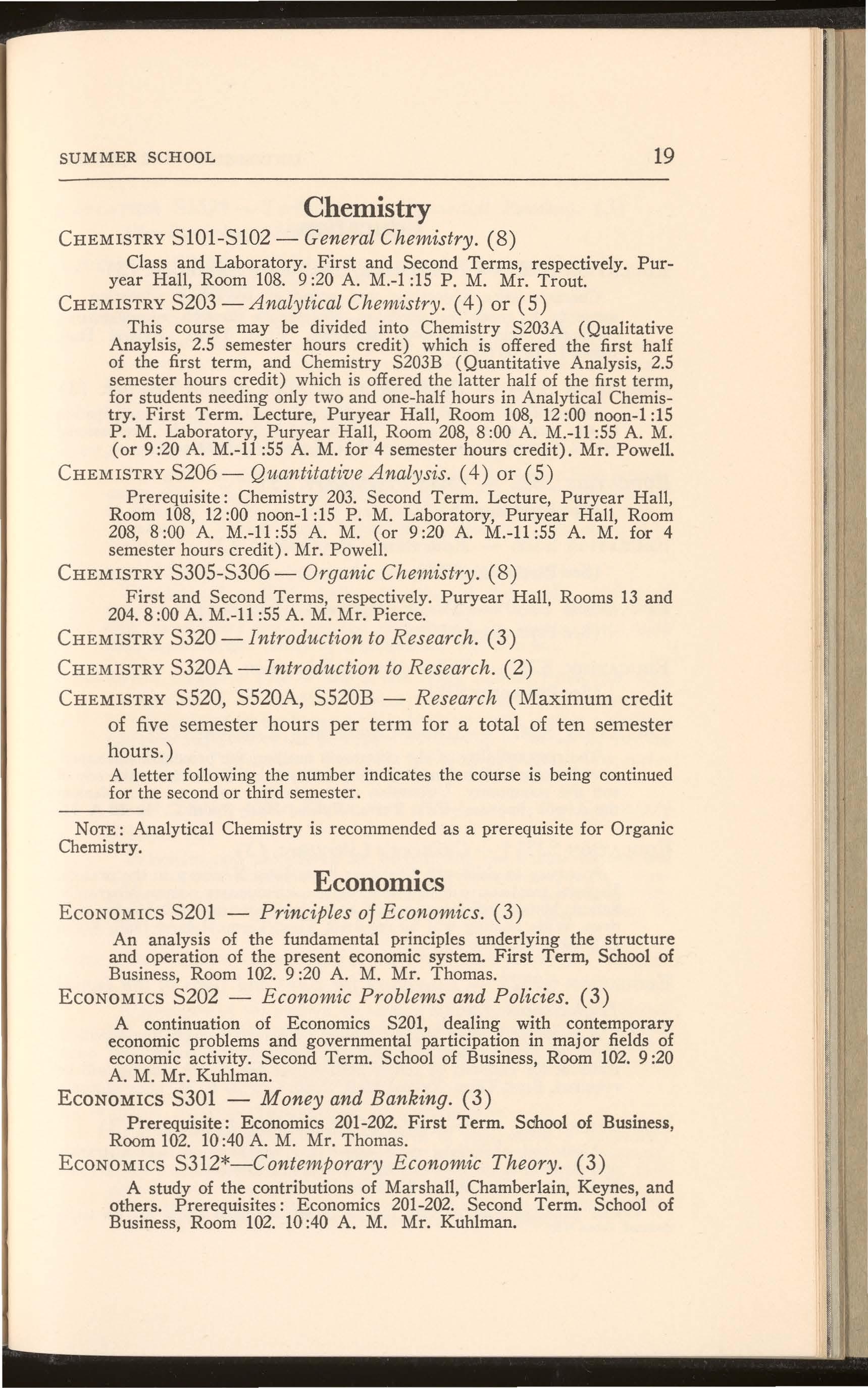
CHEMISTRY S101-S102 - General Chemistry. (8)
Class and Laboratory. First and Second Terms, respectively. Puryear Hall, Room 108. 9 :20 A. M.-1 :15 P. M. Mr. Trout.
CHEMISTRY S203 -Analytical Chemistry. ( 4) or ( 5)
This course may be divided into Chemistry S203A (Qualitative Anaylsis, 2.5 semester hours credit) which is offered the first half of the first term, and Chemistry S203B ( Quantitative Analysis, 2.5 semester hours credit) which is offered the latter half of the first term, for students needing only two and one-half hours in Analytical Chemistry. First Term. Lecture, Puryear Hall, Room 108, 12 :00 noon-1 :15 P. M. Laboratory, Puryear Hall, Room 208, 8 :00 A. M.-11 :55 A. M ( or 9 :20 A. M -11 :55 A. M. for 4 semester hours credit). Mr. Powell.
CHEMISTRY S206 - Quantitative Analysis. ( 4) or ( 5)
Prerequisite: Chemistry 203. Second Term. Lecture, Puryear Hall, Room 108, 12 :00 noon-1 :15 P. M. Laboratory, Puryear Hall, Room 208, 8 :00 A. M.-11 :55 A. M. (or 9 :20 A. M.-11 :55 A. M. for 4 semester hours credit). Mr. Powell.
CHEMISTRY S305-S306- Organic Chemistry. (8)
First and Second Terms, respectively. Puryear Hall, Rooms 13 and 204. 8 :00 A. M.-11 :55 A. M. Mr. Pierce.
CHEMISTRY S320-Introduction to Research. (3)
CHEMISTRY S320A- Introduction to Research. (2)
CHEMISTRY S520, S520A, S520B - Research (Maximum credit of five semester hours per term for a total of ten semester hours.)
A letter following the number indicates the course is being continued for the second or third semester.
NoTE: Analytical Chemistry is recommended as a prerequisite for Organic Chemistry.
ECONOMICS S201 - Principles of Economics. (3)
An analysis of the fundamental principles underlying the structure and operation of the present economic system. First Term, School of Business, Room 102. 9 :20 A. M. Mr. Thomas.
EcoNOMICS S202 - Economic Problems and Policies. (3)
A continuation of Economics S201, dealing with contemporary economic problems and governmental participation in major fields of economic activity. Second Term. School of Business, Room 102. 9 :20 A. M. Mr. Kuhlman.
EcoNOMICS S301 - Money and Banking. (3)
Prerequisite: Economics 201-202. First Term. School of Business, Room 102. 10 :40 A. M. Mr. Thomas.
EcoNOMICS S312*-Contemporary Economic Theory. (3)
A study of the contributions of Marshall, Chamberlain, Keynes, and others. Prerequisites: Economics 201-202. Second Term. School of Business, Room 102. 10 :40 A. M. Mr. Kuhlman.
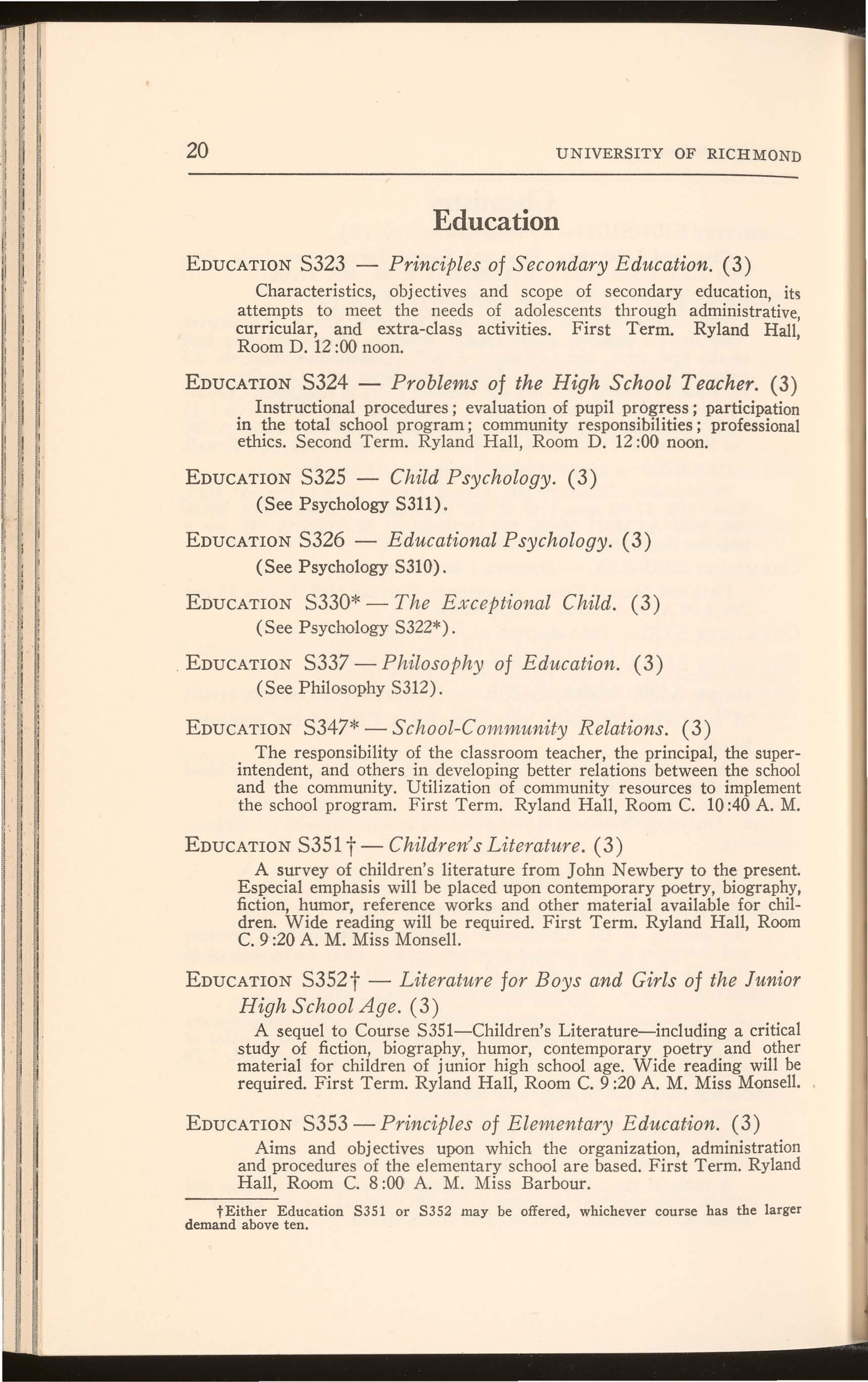
UNIVERSITY OF RICHMOND
EDUCATION S323 - Principles of Secondary Education. (3)
Characteristics, objectives and scope of secondary education, its attempts to meet the needs of adolescents through administrative curricular, and extra-class activities. First Term. Ryland Han: Room D. 12 :00 noon.
EDUCATION S324 - Problems of the High School Teacher. (3)
Instructional procedures; evaluation of pupil progress; participation in the total school program; community responsibilities; professional ethics. Second Term. Ryland Hall, Room D. 12 :00 noon.
EDUCATION S325 - Child Psychology. (3)
( See Psychology S311).
EDUCATION S326 - Educational Psychology. (3) (See Psychology S310).
EDUCATION S330* - The E x ceptional Child. (3) (See Psychology S322*)
EDUCATION S337 - Philosophy of Education. (3) (See Philosophy S312).
EDUCATION S347* -School-Community Relations. (3)
The responsibility of the classroom teacher, the principal, the superintendent, and others in developing better relations between the school and the community. Utilization of community resources to implement the school program. First Term. Ryland Hall, Room C. 10 :40 A. M.
EDUCATION S351 t - Children's Literature. ( 3)
A survey of children's literature from John Newbery to the present. Especial emphasis will be placed upon contemporary poetry, biography, fiction, humor, reference works and other material available for children. Wide reading will be required. First Term. Ryland Hall, Room C. 9 :20 A. M. Miss Monsel1.
EDUCATION S352t - Literature for Boys and Girls of the Junior High School Age. (3)
A sequel to Course S351-Children's Literature-including a critical study of fiction, biography, humor, contemporary poetry and other material for children of junior high school age. Wide reading will be required. First Term. Ryland Han, Room C. 9 :20 A. M. Miss Monsen.
EDUCATION S353 - Principles of Elementary Education . ( 3)
Aims and objectives upon which the organization, administration and procedures of the elementary school are based. First Term. Ryland Hall, Room C. 8 :00 A. M. Miss Barbour
tEither Education S351 or S352 may be offered, whichever course has the larger demand above ten.
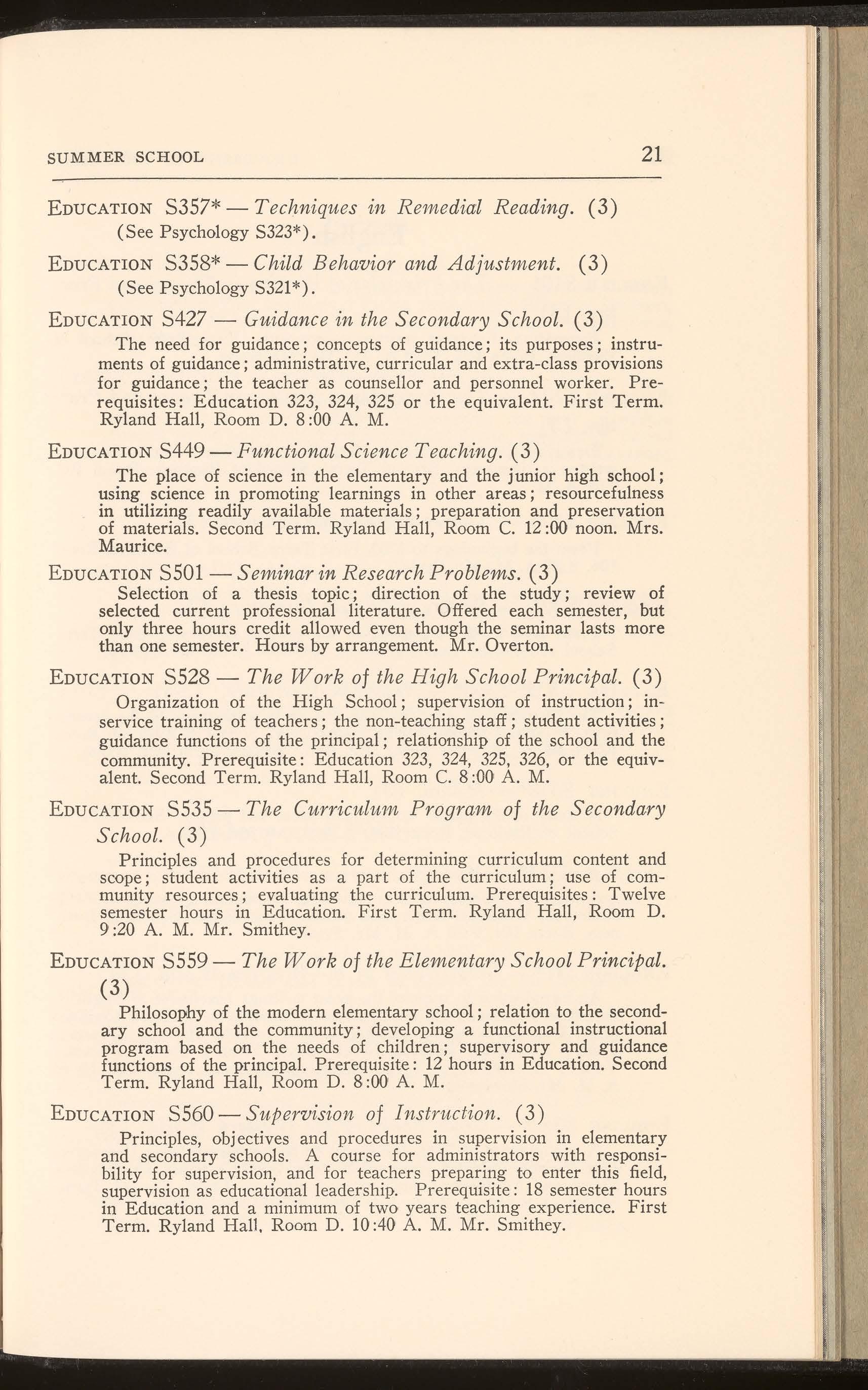
SCHOOL
EDUCATION S357* - Techniques in Remedial Reading. (3) ( See Psychology S323*).
EDUCATION S358* - Child Behavior and Adjustment. (3) ( See Psychology S321*).
EDUCATION S427 - Guidance in the Secondary School. (3)
The need for guidance; concepts of guidance; its purposes ; instruments of guidance; administrative, curricular and extra-class provisions for guidance; the teacher as counsellor and personnel worker Prerequisites: Education 323, 324, 325 or the equivalent. First Term. Ryland Hall, Room D. 8 :00 A. M.
EDUCATION S449 - Functional Science Teaching. ( 3)
The place of science in the elementary and the junior high school; using science in promoting learnings in other areas ; resourcefulness in utilizing readily available materials; preparation and preservation of materials Second Term. Ryland Hall, Room C. 12 :00 noon. Mrs. Maurice.
EDUCATION SSOl -Seminar in Research Problems. (3)
Selection of a thesis topic; direction of the study; review of selected current professional literature. Offered each semester, but only three hours credit allowed even though the seminar lasts more than one semester. Hours by arrangement. Mr. Overton
EDUCATION S528 - The Work of the High School Principal. ( 3)
Organization of the High School; supervision of instruction; inservice training of teachers; the non-teaching staff; student activities; guidance functions of the principal; relationship of the school and the community. Prerequisite: Education 323, 324, 325, 326, or the equivalent. Second Term. Ryland Hall, Room C. 8 :00 A. M.
EDUCATION SS35 - The Curriculum Program of the Secondary School. (3)
Principles and procedures for determining curriculum content and scope; student activities as a part of the curriculum; use of community resources; evaluating the curriculum. Prerequisites: Twelve semester hours in Education. First Term. Ryland Hall, Room D. 9 :20 A. M. Mr. Smithey.
EDUCATION SSS9- The Work of the Elementary School Principal. (3)
Philosophy of the modern elementary school ; relation to the secondary school and the community; developing a functional instructional program based on the needs of children; supervisory and guidance functions of the principal. Prerequisite: 12 hours in Education. Second Term. Ryland Hall, Room D. 8 :00 A. M.
EDUCATION S560 - Supervision of Instruction. ( 3)
Principles, objectives and procedures in supervision in elementary and secondary schools. A course for administrators with responsibility for supervision, and for teachers preparing to enter this field, supervision as educational leadership Prerequisite: 18 semester hours in Education and a minimum of two years teaching experience. First Term. Ryland Hall. Room D. 10 :40 A. M. Mr Smithey.
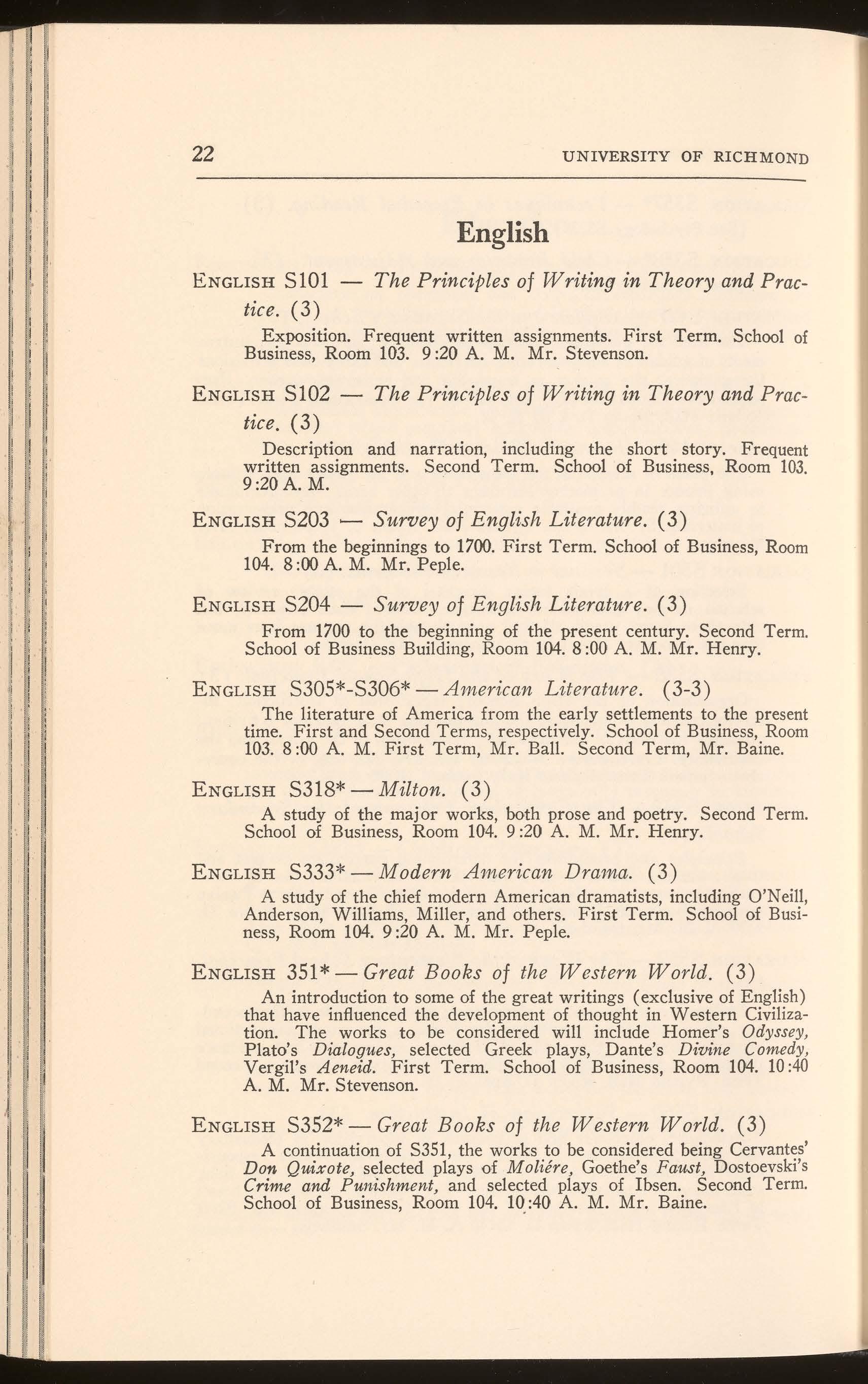
ENGLISH SlOl - The Principles of Writing in Theory and Practice. (3)
Exposition. Frequent written assignments. First Term. School of Business, Room 103. 9 :20 A. M. Mr. Stevenson.
ENGLISH S102 - The Principles of Writing in Theory and Practice. (3)
Description and narration, including the short story. Frequent written assignments. Second Term. School of Business, Room 103 . 9:20A . M.
ENGLISH S203 Survey of English Literature. (3)
From the beginnings to 1700. First Term. School of Business, Room 104. 8 :00 A. M. Mr. Peple.
ENGLISH S204 - Survey of English Literature. (3)
From 1700 to the beginning of the present century. Second Term. School of Business Building, Room 104. 8 :00 A. M. Mr. Henry.
ENGLISH S305*-S306* - American Literature. ( 3-3)
The literature of America from the early settlements to the present time First and Second Terms, respectively. School of Business, Room 103. 8 :00 A. M. First Term, Mr. Ball. Second Term, Mr. Baine.
ENGLISH S318* - Milton. ( 3)
A study of the major works, both prose and poetry . Second Term. School of Business, Room 104. 9 :20 A. M. Mr. Henry.
ENGLISH S333* - Modern American Drama. ( 3)
A study of the chief modern American dramatists, including O'Neill , Anderson, Williams, Miller, and others. First Term. School of Business, Room 104. 9 :20 A. M Mr. Peple.
ENGLISH 351*-Great Books of the Western World. (3)
An introduction to some of the great writings ( exclusive of English ) that have influenced the development of thought in Western Civilization. The works to be considered will include Homer's Odyssey, Plato's Dialogues, selected Greek plays, Dante's Divine Comedy, Vergil's Aeneid First Term . School of Business, Room 104. 10 :40 A M. Mr. Stevenson.
ENGLISH S352* - Great B oaks of the Western World. ( 3)
A continuation of S351, the works to be considered being Cervantes' Don Quixote, selected plays of Moliere, Goethe's Faust, Dostoevski 's Crime and Punishment, and selected plays of Ibsen. Second Term . School of Business, Room 104. 1~ :40 A. M. Mr . Baine.
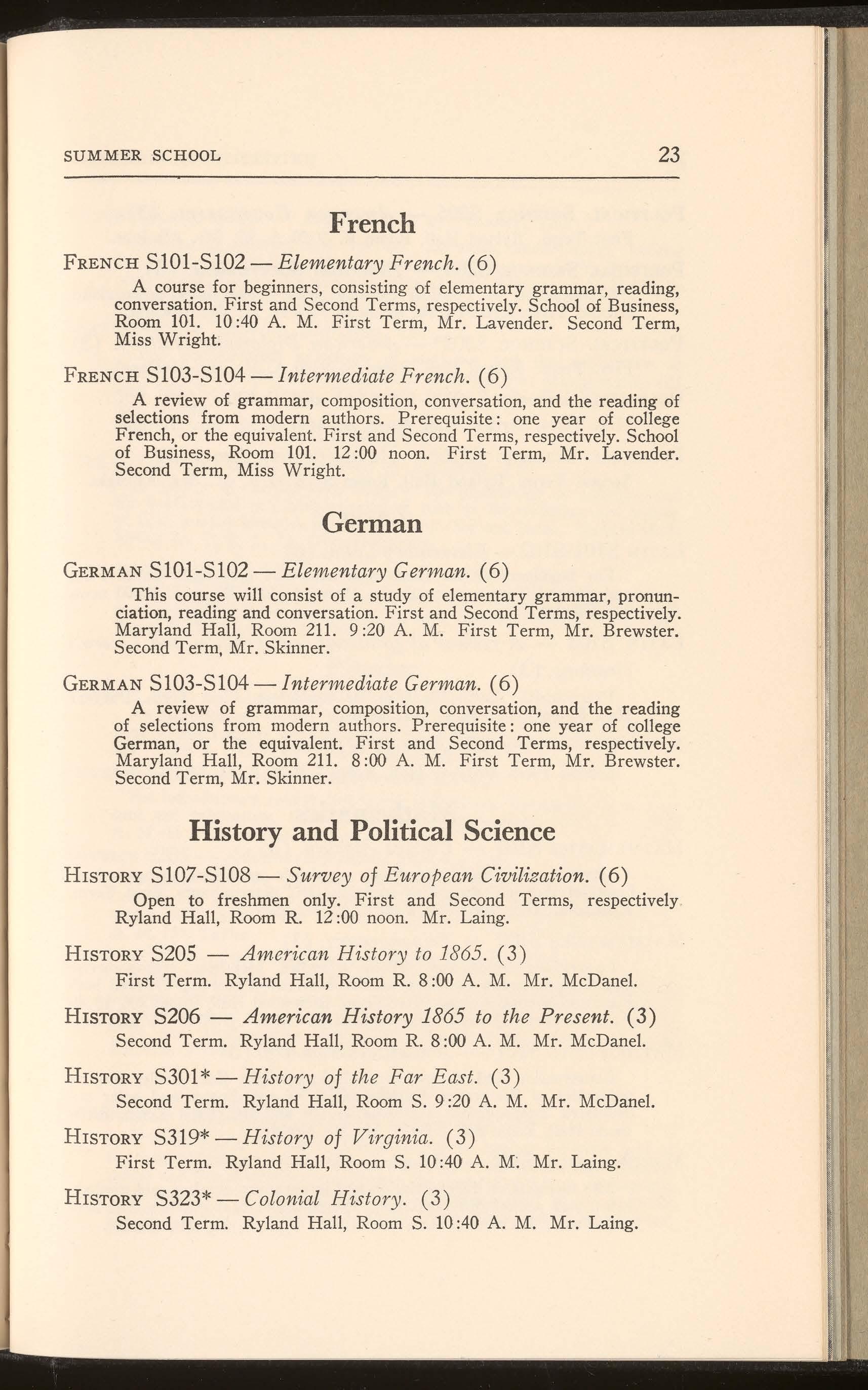
FRENCH S101-S102 - Elementary French. (6)
A course for beginners, consisting of elementary grammar, reading, conversation. First and Second Terms, respectively. School of Business, Room 101. 10 :40 A. M. First Term, Mr. Lavender. Second Term, Miss Wright.
FRENCH S103-S104-Intermediate French. (6)
A review of grammar, composition, conversation, and the reading of selections from modern authors. Prerequisite: one year of college French, or the equivalent. First and Second Terms, respectively. School of Business, Room 101. 12 :00 noon. First Term, Mr. Lavender. Second Term, Miss Wright.
GERMAN S101-S102- Elementary German. (6)
This course will consist of a study of elementary grammar, pronunciation, reading and conversation. First and Second Terms, respectively. Maryland Hall, Room 211. 9 :20 A. M. First Term, Mr. Brewster. Second Term, Mr. Skinner.
GERMAN S103-S104-Intermediate German. (6)
A review of grammar, composition, conversation, and the reading of selections from modern authors. Prerequisite: one year of college German, or the equivalent. First and Second Terms, respectively. Maryland Hall, Room 211. 8 :00 A. M. First Term, Mr. Brewster. Second Term, Mr. Skinner.
HISTORY S107-S108 - Survey of European Civilization. (6) Open to freshmen only. First and Second Terms, respectively Ryland Hall, Room R. 12 :00 noon. Mr. Laing.
HISTORY S205 - American History to 1865. (3)
First Term. Ryland Hall, Room R. 8 :00 A. M Mr. McDanel.
HISTORY S206 - American History 1865 to the Present. (3)
Second Term. Ryland Hall, Room R. 8 :00 A. M. Mr. McDanel.
HISTORY S301 * - History of the Far East. ( 3)
Second Term. Ryland Hall, Room S. 9 :20 A. M. Mr. McDanel.
HISTORY S319* -History of Virginia. (3)
First Term. Ryland Hall, Room S. 10 :40 A. M; Mr. Laing.
HISTORY S323* - Colonial History. (3)
Second Term. Ryland Hall, Room S. 10 :40 A. M. Mr. Laing.
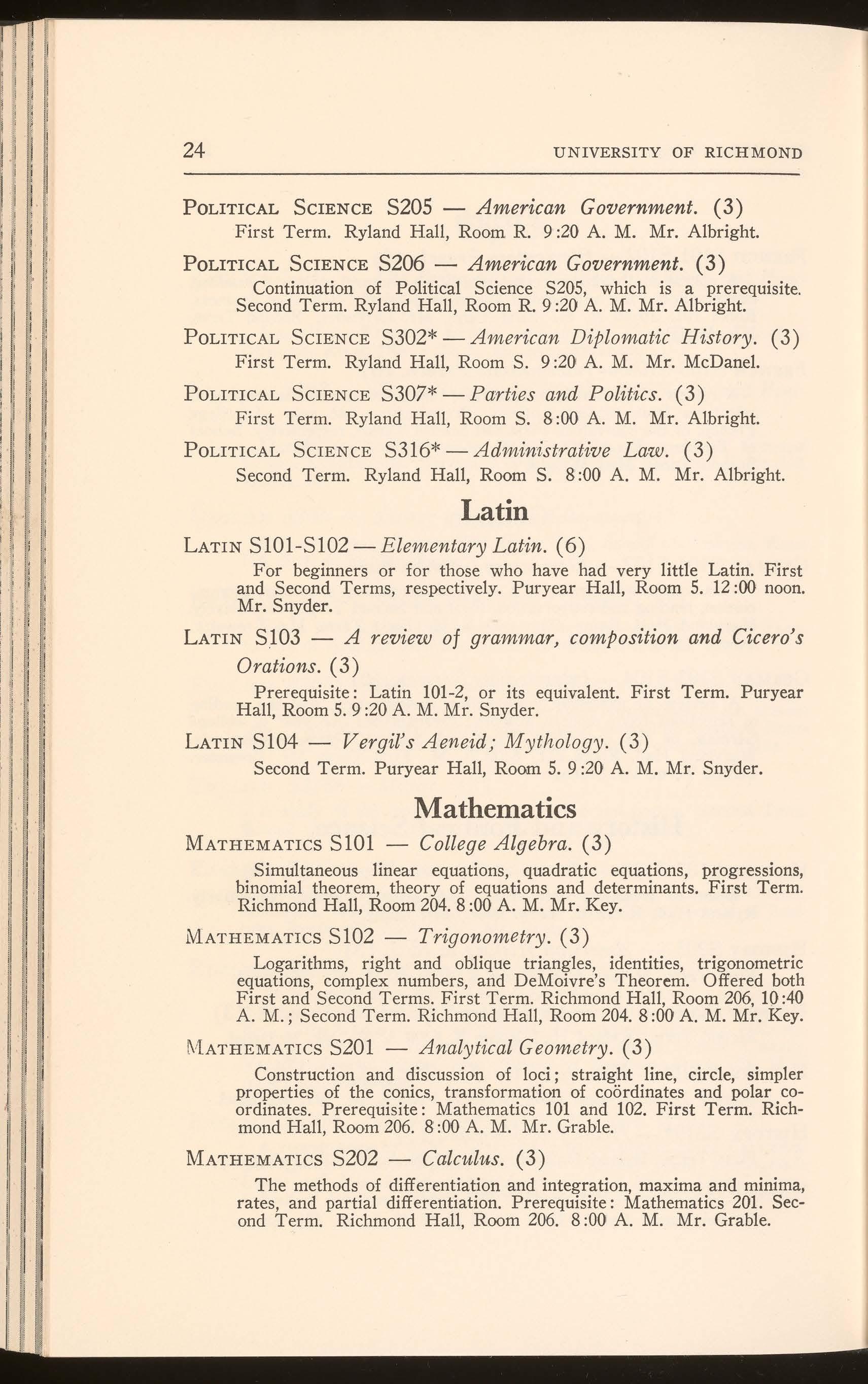
POLITICAL SCIENCE S205 - American Government. (3)
First Term. Ryland Hall, Room R. 9 :20 A. M. Mr. Albright.
POLITICALSCIENCE S206 - American Government. (3)
Continuation of Political Science S205, which is a prerequisite. Second Term. Ryland Hall, Room R. 9 :20 A. M. Mr. Albright.
POLITICALSCIENCE S302* -American Diplomatic History. ( 3)
First Term. Ryland Hall, Room S. 9 :20 A. M. Mr. McDanel.
POLITICALSCIENCE S307* - Parties and Politics. (3)
First Term. Ryland Hall, Room S. 8 :00 A. M. Mr. Albright.
POLITICALSCIENCE S316* -Administrative Law. (3)
Second Term. Ryland Hall, Room S. 8 :00 A. M. Mr. Albright.
LATIN Sl01-Sl02-Elementary Latin. (6)
For beginners or for those who have had very little Latin. First and Second Terms, respectively. Puryear Hall, Room 5. 12 :00 noon. Mr. Snyder.
LATIN Sl03 - A review of grammar, composition and Cicero's Orations. (3)
Prerequisite: Latin 101-2, or its equivalent. First Term. Puryear Hall, Room 5. 9 :20 A. M. Mr. Snyder.
LATIN S104 - Vergil's Aeneid; Mythology. (3)
Second Term. Puryear Hall, Room 5. 9 :20 A. M. Mr. Snyder.
MATHEMATICSSlOl - College Algebra. (3)
Simultaneous linear equations, quadratic equations, progressions, binomial theorem, theory of equations and determinants. First Term. Richmond Hall, Room 204. 8 :00 A. M. Mr. Key.
MATHEMATICSS102 - Trigonometry. (3)
Logarithms, right and oblique triangles, identities, trigonometric equations, complex numbers, and DeMoivre's Theorem. Offered both First and Second Terms. First Term. Richmond Hall, Room 206, 10 :40 A. M.; Second Term. Richmond Hall, Room 204. 8 :00 A. M. Mr. Key.
MATHEMATICSS201 - Analytical Geometry. (3)
Construction and discussion of loci ; straight line, circle, simpler properties of the conics, transformation of coordinates and polar coordinates. Prerequisite: Mathematics 101 and 102. First Term. Richmond Hall, Room 206. 8 :00 A. M. Mr. Grable.
MATHEMATICSS202 - Calrnlus. (3)
The methods of differentiation and integration, maxima and minima, rates, and partial differentiation. Prerequisite: Mathematics 201. Second Term. Richmond Hall, Room 206. 8 :00 A. M. Mr. Grable.
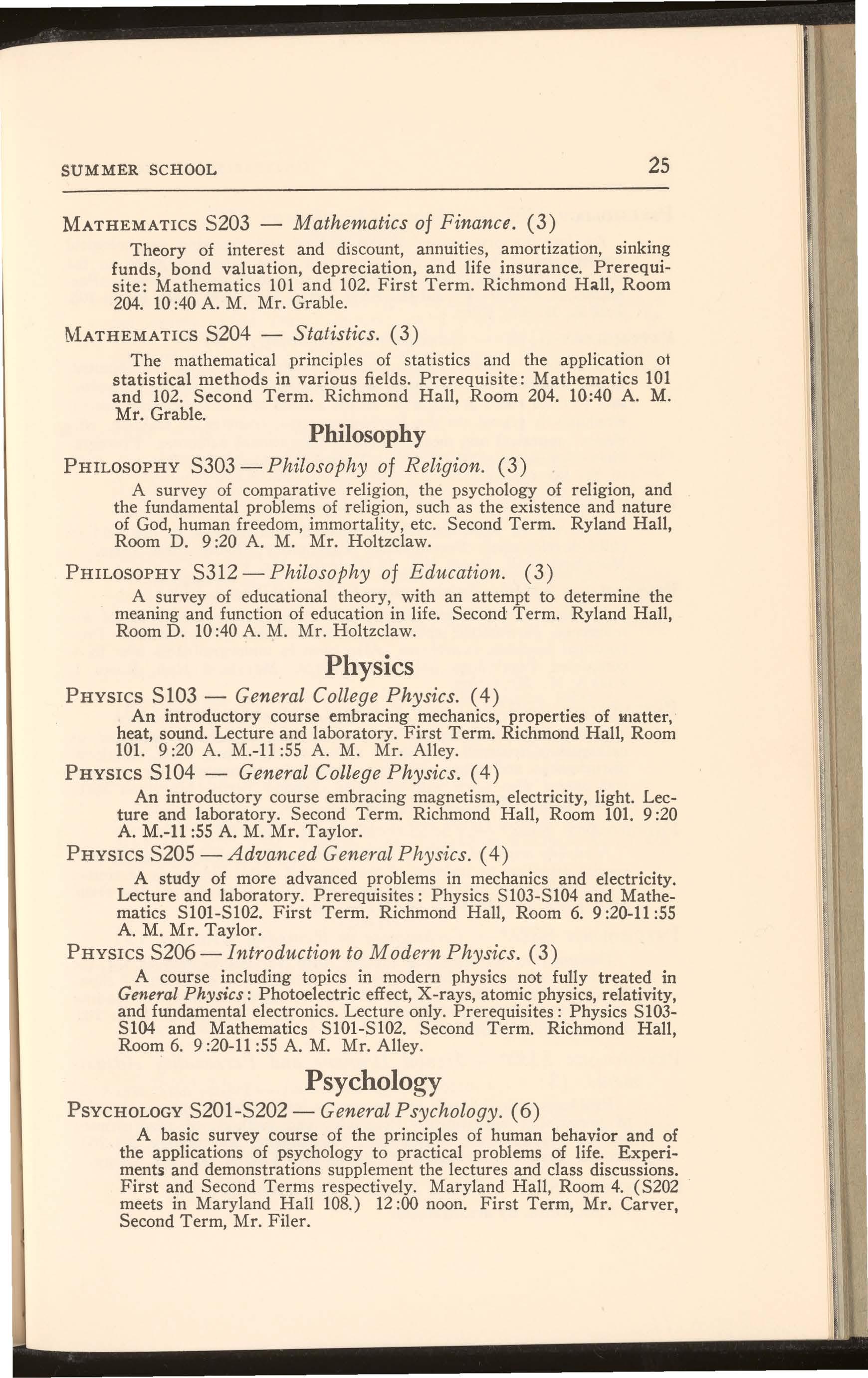
MATHEMATICS S203 - Mathematics of Finance. (3)
Theory of interest and discount, annuities, amortization, sinking funds, bond valuation, depreciation, and life insurance. Prerequisite: Mathematics 101 and 102. First Term. Richmond Hall, Room 204. 10 :40 A M. Mr. Grable.
MATHEMATICS S204 - Statistics. (3)
The mathematical principles of statistics and the application ot statistical methods in various fields. Prerequisite: Mathematics 101 and 102. Second Term. Richmond Hall, Room 204. 10:40 A. M. Mr. Grable.
PHILOSOPHY S303 - Philosophy of Religion. ( 3)
A survey of comparative religion, the psychology of religion, and the fundamental problems of religion, such as the existence and nature of God, human freedom, immortality, etc. Second Term. Ryland Hall, Room D. 9 :20 A. M. Mr. Holtzclaw.
PHILOSOPHY S312-Philosophy of Education. (3)
A survey of educational theory, with an attempt to determine the meaning and function of education in life. Second Term. Ryland Hall, Room D. 10 :40 A. M. Mr. Holtzclaw.
PHYSICS S 103 - General College Physics. ( 4)
An introductory course embracing mechanics, properties of tnatter, heat, sound. Lecture and laboratory. First Term. Richmond Hall, Room 101. 9 :20 A. M.-11 :55 A M. Mr. Alley
PHYSICS S104 - General College Physics. (4)
An introductory course embracing magnetism, electricity, light. Lecture and laboratory. Second Term. Richmond Hall, Room 101. 9 :20 A. M.-11:55 A. M. Mr. Taylor
PHYSICS S205 -Advanced General Physics. ( 4)
A study of more advanced problems in mechanics and electricity. Lecture and laboratory. Prerequisites : Physics Sl03-S104 and Mathematics Sl01-S102. First Term. Richmond Hall, Room 6. 9 :20-11 :55 A. M. Mr. Taylor.
PHYSICS S206- Introduction to Modern Physics. (3)
A course including topics in modern physics not fully treated in General Physics: Photoelectric effect, X-rays, atomic physics, relativity, and fundamental electronics. Lecture only. Prerequisites: Physics S103Sl04 and Mathematics Sl01-S102. Second Term. Richmond Hall, Room 6. 9 :20-11 :55 A. M. Mr. Alley.
PSYCHOLOGY S201-S202 - General Psychology. (6)
A basic survey course of the principles of human behavior and of the applications of psychology to practical problems of life. Experiments and demonstrations supplement the lectures and class discussions. First and Second Terms respectively. Maryland Hall, Room 4. ( S202 meets in Maryland Hall 108.) 12 :00 noon. First Term, Mr. Carver, Second Term, Mr. Filer.
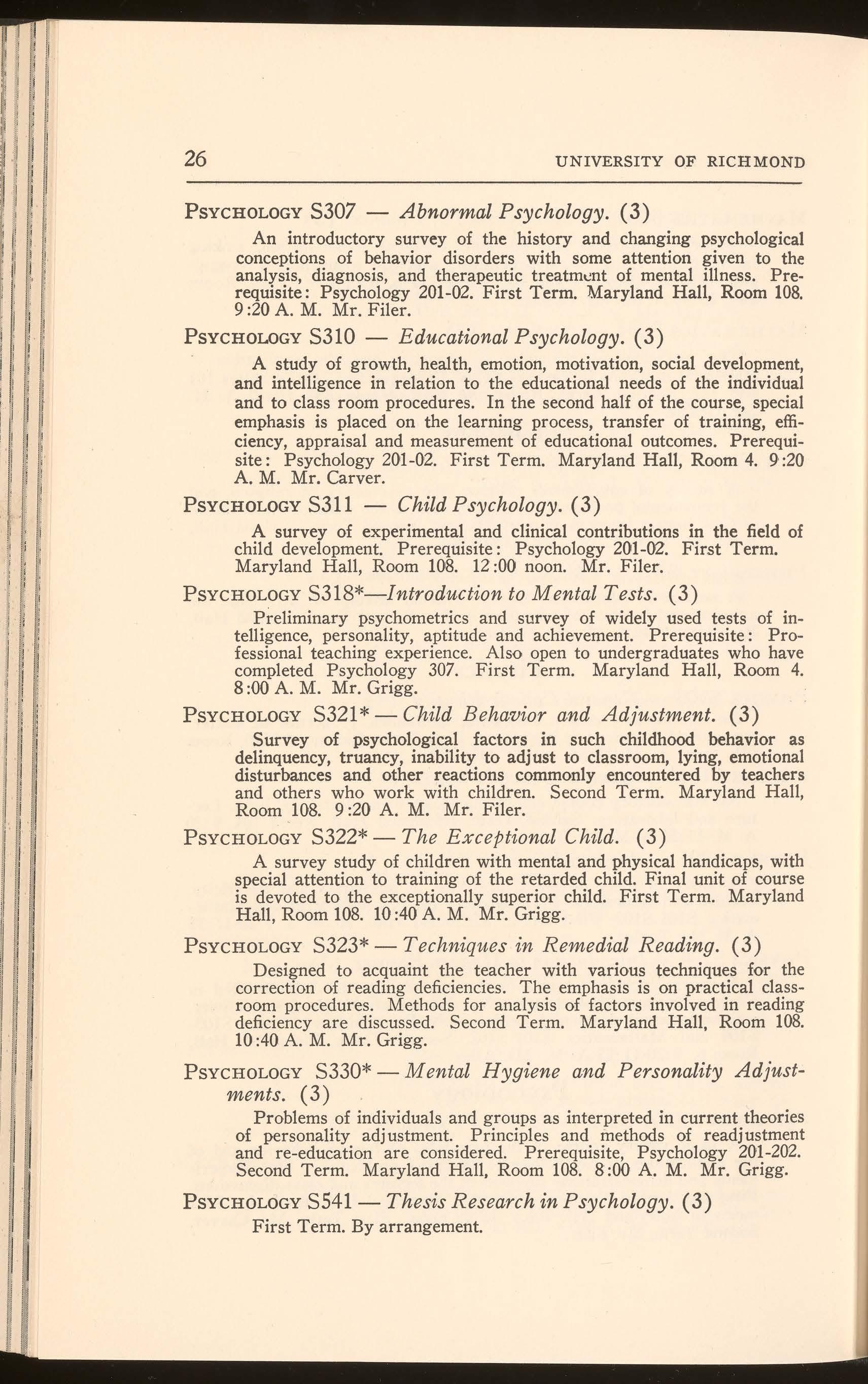
PSYCHOLOGY S307 Abnormal Psychology. (3)
An introductory survey of the history and changing psychological conceptions of behavior disorders with some attention given to the analysis, diagnosis, and therapeutic treatm~nt of mental illness. Prerequisite: Psychology 201-02. First Term. Maryland Hall, Room 108. 9 :20 A. M. Mr. Filer.
PSYCHOLOGY S310 - Educational Psychology. (3)
A study of growth, health, emotion, motivation, social development, and intelligence in relation to the educational needs of the individual and to class room procedures. In the second half of the course, special emphasis is placed on the learning process, transfer of training, efficiency, appraisal and measurement of educational outcomes. Prerequisite: Psychology 201-02. First Term. Maryland Hall, Room 4. 9:20 A. M. Mr. Carver.
PSYCHOLOGY S311 - Child Psychology. (3)
A survey of experimental and clinical contributions in the field of child development. Prerequisite: Psychology 201-02. First Term. Maryland Hall, Room 108. 12 :00 noon. Mr. Filer.
PSYCHOLOGY S318*-Introduction to Mental Tests. (3)
Preliminary psychometrics and survey of widely used tests of intelligence, personality, aptitude and achievement. Prerequisite: Professional teaching experience. Also open to undergraduates who have completed Psychology 307. First Term. Maryland Hall, Room 4. 8 :00 A. M. Mr. Grigg.
PSYCHOLOGY S321 * - Child Behavior and Adjustment. (3)
Survey of psychological factors in such childhood behavior as delinquency, truancy, inability to adjust to classroom, lying, emotional disturbances and other reactions commonly encountered by teachers and others who work with children. Second Term. Maryland Hall, Room 108. 9 :20 A. M. Mr. Filer.
PSYCHOLOGY S322* - The Exceptional Child. (3)
A survey study of children with mental and physical handicaps, with special attention to training of the retarded child. Final unit of course is devoted to the exceptionally superior child. First Term. Maryland Hall, Room 108. 10 :40 A. M. Mr. Grigg.
PSYCHOLOGY S323* - Techniques in Remedial Reading. (3)
Designed to acquaint the teacher with various techniques for the correction of reading deficiencies. The emphasis is on practical classroom procedures. Methods for analysis of factors involved in reading deficiency are discussed. Second Term. Maryland Hall, Room 108. 10 :40 A. M. Mr. Grigg.
PSYCHOLOGY S330* - Mental Hygiene and Personality Adjustments. (3)
Problems of individuals and groups as interpreted in current theories of personality adjustment. Principles and methods of readjustment and re-education are considered. Prerequisite, Psychology 201-202. Second Term. Maryland Hall, Room 108. 8:00 A. M. Mr. Grigg.
PSYCHOLOGY S541- Thesis Research in Psychology. (3)
First Term. By arrangement.
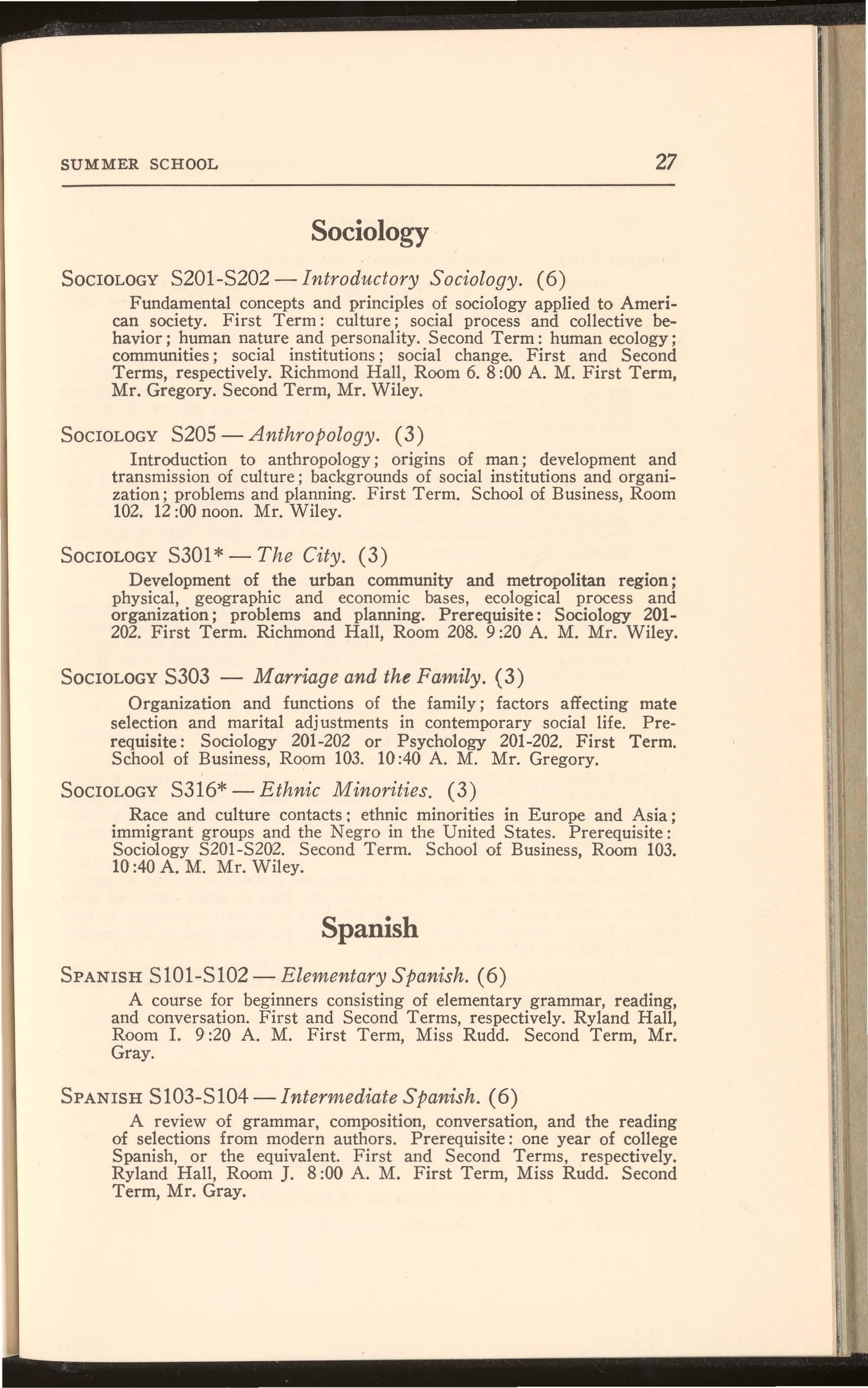
SocIOLOGYS2O1-S2O2- Introductory Sociology. (6)
Fundamental concepts and principles of sociology applied to American society. First Term: culture; social process and collective behavior; human nature and personality. Second Term: human ecology; communities ; social institutions ; social change First and Second Terms, respectively. Richmond Hall, Room 6 8 :00 A. M. First Term, Mr. Gregory. Second Term, Mr Wiley.
SocIOLOGYS2O5-Anthropology. (3)
Introduction to anthropology; origins of man; development and transmission of culture; backgrounds of social institutions and organization; problems and planning . First Term . School of Business, Room 102. 12 :00 noon. Mr. Wiley.
SocIOLOGYS3O1*-The City. (3)
Development of the urban community and metropolitan region; physical, geographic and economic bases, ecological process and organization; problems and planning. Prerequisite: Sociology 201202. First Term. Richmond Hall, Room 208 9 :20 A. M. Mr. Wiley.
SocIOLOGYS3O3 - Marriage and the Family. (3)
Organization and functions of the family ; factors affecting mate selection and marital adjustments in contemporary social life Prerequisite : Sociology 201-202 or Psychology 201-202. First Term. School of Business, Room 103 10 :40 A. M. Mr. Gregory.
SOCIOLOGYS316* - Ethnic Minorities. (3)
Race and culture contacts; ethnic minorities in Europe and Asia; immigrant groups and the Negro in the United States. Prerequisite: Sociology S201-S202. Second Term School of Business, Room 103. 10 :40 A. M. Mr. Wiley.
SPANISHSl01-S102- Elementary Spanish. (6)
A course for beginners consisting of elementary grammar, reading, and conversation. First and Second Terms, respectively. Ryland Hall, Room I. 9 :20 A. M. First Term, Miss Rudd. Second Term, Mr. Gray.
SPANISHS1O3-S104- lntermediate Spanish (6)
A review of grammar, composition, conversation, and the reading of selections from modern authors. Prerequisite: one year of college Spanish, or the equivalent. First and Second Terms, respectively. Ryland Hall, Room J. 8 :00 A. M. First Term, Miss Rudd. Second Term, Mr. Gray.

SPEECH SlOl - Fundamentals of Speech. (3)
Study of the basic elements of speech with practice in organization, composition and delivery. First Term. Richmond Hall, Room 206. 9 :20 A. M. Mr. Williams.
SPEECH Sl02-Effective Speaking. (3)
Continuation of Speech SlOl, with analysis of speeches for different types of situations, application of techniques of delivery. Prerequisite: Speech 101. Second Term. Richmond Hall, Room 206. 9 :20 A. M. Mr. Golden.
SPEECH SlOS-Business Speaking. (3)
Fundamentals of underlying good speech; organization, content and delivery; applied on the platform, in conference rooms and in sales and persuasive situations. Primarily for Business School students who have not had Speech 101. Second Term. Richmond Hall, Room 208. 10 :40 A. M. Mr. Golden.
SPEECH S3O3 - Speech for the Classroom Teacher. (3)
Development and use of speaking voice with attention to professional and social needs of the student ; techniques of good speech ; simple diagnostic principles for speech handicapped; speech education and its relation to other areas of education. First Term. Richmond Hall, Room 208. 10 :40 A. M. Mr. Williams.
The University of Richmond has two units of ROTC, the Army ROTC, and the Air Force ROTC. Qualified men may take courses in one of these ROTC units, along with their regular college studies, leading to a commission in the Army. or the Air Force Reserve as second lieutenant, to be awarded at the time of college graduation.
Students who are now enrolled in Richmond College or in the School of Business Administration, as well as those who plan to enter either of these divisions of the University in the fall will find it to their advantage to take courses in the Summer School in order to lighten their load in the regular session when they take ROTC training.
For detailed information on ROTC, the student should write to the Dean of Richmond College.
Summer Session, 1954
Faculty of Instruction
JAMESH. BARNETT,JR., LL.M.
JAMESW. PAYNE,JR., LLB.

HARRYL. SNEAD,JR., LL.B.
The T. C. Williams School of Law is a division of the University of Richmond, and the degrees in law are conferred by the corporation of the University of Richmond. It is fully accredited by the American Bar Association, and is a member of the Association of American Law Schools .
Admission: For admission to the three year law program, three years of acceptable college work, including at least ninety (90) semester hours, with a scholastic average, based on all work undertaken, at least equal to the quality of work required for graduation in the institution attended, are required. Similarly, two years, including at least sixty (60) semester hours, of such college work are required for admission to the four year law program.
Requirements for Graduat i on : In the three year law program, eighty-four ( 84) semester hours of successful law study are required for the degree. In the four year law program, one hundred and twelve ( 112) semester hours of successful law study are required. In either program, one semester of residence and twelve ( 12) semester hours may be gained by attendance at one full summer session. No first year work is offered in the summer session.
Fees
College fee ( both terms) ........ ...... ............................ $120.00
Tuition (both terms)................................................ 75.00 Calendar
JuNE 8, TUESDAY-First Term begins.
JuLY 23, FRIDAY-First Term ends .
JULY 24, SATURDAY-Second Term begins. SEPTEMBER8, WEDNESDAY-Second Term ends.
For further informat i on, apply to Dean, School of Law 601 North Lombardy Street Richmond, Virginia
Course-First Term
Accounting S203
Bible S103
Biology S107
Bus. Adminis. S301
Chemistry S203L
Chemistry S305C
Education S353
Education S427
English S203
English S305
German Sl03
History S205
Mathematics SlOl
Mathematics S201
Political Science S307
Psychology S318
Sociology S201
Spanish S103
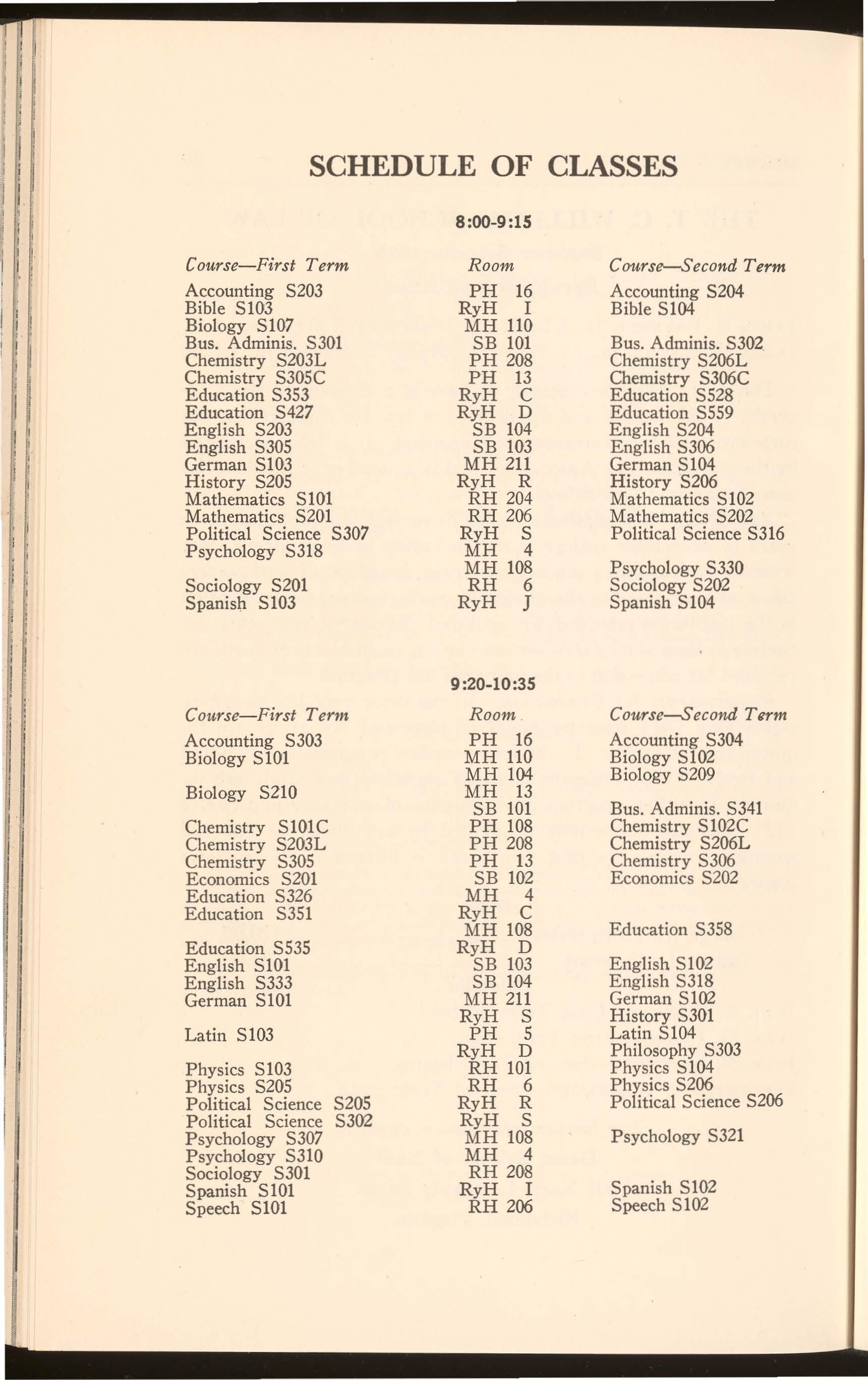
Course-First Term
Accounting S303
Biology S 101
Biology S210
Chemistry Sl0lC
Chemistry S203L
Chemistry S305
Economics S201
Education S326
Education S351
Education S535
English SlOl
English S333
German SlOl
Latin Sl03
Physics Sl03
Physics S205
Political Science S205
Political Science S302
Psychology S307
Psychology S310
Sociology S301
Spanish SlOl
Speech SlOl
8:00-9:15
Room
PH 16
RyH I
MH 110
SB 101
PH 208
PH 13
RyH C
RyH D
SB 104
SB 103
MH 211
RyH R
RH 204
RH 206
RyH S
MH 4
MH 108
RH 6
RyH J
9:20-10:35
Room .
PH 16
MH 110
MH 104
MH 13
SB 101
PH 108
PH 208
PH 13
SB 102
MH 4
RyH C
MH 108
RyH D
SB 103
SB 104
MH 211
RyH s
PH 5
RyH D
RH 101
RH 6
RyH R
RyH s
MH 108
MH 4
RH 208
RyH I
RH 206
Course-Second Term
Accounting S204
Bible S104
Bus. Adminis. S302
Chemistry S206L
Chemistry S306C
Education S528
Education S559
English S204
English S306
German S104
History S206
Mathematics S102
Mathematics S202
Political Science S316
Psychology S330
Sociology S202
Spanish Sl04
Course-Second Tllrm
Accounting S304
Biology S102
Biology S209
Bus. Adminis. S341
Chemistry S 102C
Chemistry S206L
Chemistry S306
Economics S202
Education S358
English S102
English S318
German S102
History S301
Latin S104
Philosophy S303
Physics S104
Physics S206
Political Science S206
Psychology S321
Spanish Sl02
Speech S102
Course-First Term
Bible S312
Biology SlOl
Biology S210
Chemistry SlOlL
Chemistry S203L
Chemistry S305L
Economics S301
Education S330
Education S347
Education S560
English S351
French SlOl
History S319
Mathematics Sl02
Mathematics S203
Physics S103
Physics S205
Psychology S322
Sociology S303
Speech S303

Course-First Term
Chemistry SlOlL
Chemistry S203C
Education S323
Education S325
French Sl03
History S107
Latin Sl0l
Psychology S201
Psychology S311
Sociology S205
10:40-11:55
Room
RyH I
MH 110
MH 104
MH 13
PH 108
PH 208
PH 204
SB 102
MH 108
RyH C
RyH D
MH 108
SB 104
SB 101
RyH s
RH 206
RH 204
RyH D
RH 101
RH 6
MH 108
SB 103
RH 208
12:00-1:15
Room
PH 103
PH 108
RyH D
MH 108
RyH C
SB 101
RyH R
PH 5
MH 4
MH 108
SB 102
Course-Second Term
Bible S309
Biology S102
Biology S209
Chemistry S102L
Chemistry S206L
Chemistry S306L
Economics S312
Education S337
Education S357
English S352
French Sl02
History S323
Mathematics S204
Philosophy S312
Physics S 104
Physics S206
Psychology S323
Sociology S316
Speech SlOS
Course-Second Term
Chemistry Sl02L
Chemistry S206C
Education S324
Education S449
French S104
History S108
Latin S102
Psychology S202
In the laboratory sciences, C and L after the number indicate class and laboratory respectively. The small letters, (a), (b), etc., indicate sections of the same class.
Rooms C through S are in Ryland Hall. SB indicates School of Business, MH Maryland Hall, PH Puryear Hall, RH Richmond Hall, and Ry H Ryland Hall. Meeting places of the respective classes are the same for both first and second terms, unless otherwise indicated.
